Es dürfte lehrreich sein, dabei zunächst an die Wundergeschichten zu denken, die in der biblischen Bezeugung des Werkes und Wortes Gotes eine so anstössig grosse Rolle spielen. . . .
|
restoring our biblical and constitutional foundations
|
| welcome |
January 2010 Blog Archives
Sunday, January 31
6:30 PM Conclusions #12-13 (from Paul, Apostle of Weakness):
#12: Paul's conception of weakness stands in a dynamic relationship with his christology. In Corinthians, it is his focus on Christ that binds his various pronouncements together and gives unity to their miscellaneous contents.
#13: The central idea in the Pauline weakness motif is that the greatest revelation of divine power has occurred in the person and work of Jesus Christ in the midst of his human and earthly existence.
5:59 PM FYI: Southeastern is officially "closed" tomorrow while the staff clears away the snow and ice. Classes will resume on Tuesday (along with convocation at 10:00 am). Returning students, please drive carefully.
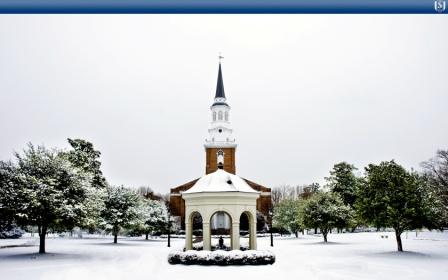
5:45 PM It's on for Thursday night! The installation of our brand new Dell computer, that is. You know what that means, right? Pictures!!!!!
5:40 PM Today I am beginning, for your edification and mine, a series of quotes from Elizabeth Elliott's A Chance to Die, the biography of Amy Carmichael, missionary to India. The writing is superb. It acts like carrots dangling before a donkey's nose, luring him on to read even the pompous phraseology of which at times the great Elliott's style is compounded. On p. 381 we read:
For support the Fellowship depends on the faithfulness of the Lord, who leads His children to send what is needed and Himself balances the books. Most of it depends on prayer.
I could not think of a better way to describe how Becky and I operate in Ethiopia. We are not fundraisers. Never have been and never will be. Our task is simply to make the needs in Ethiopia known and then watch the Lord impress these needs upon the hearts of His people. And He has done just that. Consistently. Not only so, but He blesses us in most unexpected ways. Take the Galana clinic, for example. It is has been in operation for only a year and a half, yet it is fully staffed and operated by Ethiopians and has just been upgraded by the Ethiopian government from a health clinic to a health center. Not only that, for the first quarter of the year (the Ethiopian year begins on Sept. 11) the clinic has been 80 percent self-supporting. "It all depends on prayer," I guess you could say -- and the God who delights to surprise His children with every good thing.
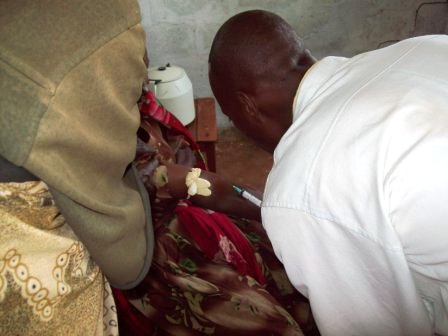
What a wonderful perspective Amy Carmichael had. It all "depends on the faithfulness of the Lord." Truer words were never spoken. Praise be to Him!
5:12 PM Here's a sign I'd like to see hung over the platforms in our church buildings:
That in all things He might have the preeminence.
I'd put it right above the pulpit, too. Wouldn't that be great?
5:02 PM Just back from feeding the cattle. Twas a beautiful, sun-drenched day. Got lots of pictures but can't publish them! Not to despair, however. I'll inundate you eventually. (You are forewarned.)
2:22 PM Mmmm, I wish I were here. There is nothing in this world quite like an Ethiopian coffee ceremony.

Hot, black, thick, and a 3-cup minimum.
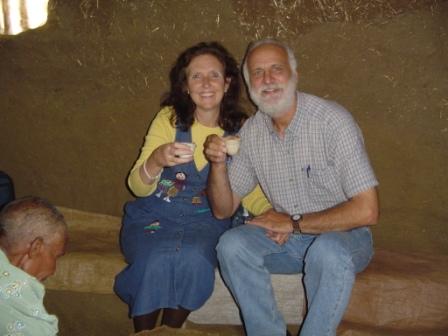
Betam turuno!
1:56 PM The latest addition to our home page is called Sacerdotalism Or Every-Member Ministry?
12:24 PM Have you had a chance to read my first Spanish essay yet? It's called Cristianos sin Fronteras. Don't you just love those "false friends" like the word "sin," which means one thing in English and quite another in Spanish? I recall watching the Spanish International Network while living in Southern California with a view toward improving my spoken Spanish. Of course, much of the programming consisted of novellas and narcissistic commercials (much like American networks!). One had to put up with all that if one wanted to learn the language. At times, though, it seemed not inappropriate that the network's acronym was "SIN"!
Look for more Spanish language essays soon.
12:02 PM Tor Vegge's Paulus und das antike Schulwesen: Schule und Bildung des Paulus is reviewed in the latest issue of RBL. Vegge's thesis is simple and straightforward:
Vegge geht davon aus, dass der Apostel die Bildungsinstitutionen der hellenistischen Welt (die „Institution ‚Schule‘ seiner Gegenwart“, xvi) gekannt habe und mit ihnen auf unterschiedliche Weise und auf unterschiedlichen Ebenen in Berührung gekommen sei. In seinen Briefen zeige sich, dass er Elemente vor allem der antiken Rhetorik formal wie inhaltlich aufgenommen hat. Dadurch werde der große Einfluss antiker Bildungsstrukturen auf Paulus und sein theologisches Denken deutlich.
If Vegge is correct, then Paul was certainly capable of an elevated style as seen, for example, in 1 Corinthians 13 or in the Christ hymn of Phil. 2:5-11. His conclusion also has implications for the question of the authorship of Hebrews. I have argued elsewhere (Faith and Mission 18) that the style of Paul and the style of Hebrews are sui generis and that the stylistic argument used to overturn Pauline authorship is based on a superficial comparison of Hebrews and Paul.
At any rate, thanks to this review, I plan to order Vegge's book for our library and read it for myself.
11:34 AM Just began reading Elizabeth Elliott's biography of Amy Carmichael. It's called A Chance to Die.

Becky just finished it. She tells me it is a must read. I'm sure it is. Elizabeth Elliott is one of my favorite authors. Already I'm reeling. The writer is an excellent verbal toreador and gives a superb performance of spiritual dart-sticking. I'm also enjoying reading about the Indian state of Kerala, which I once visited in order to speak at the opening of a Bible school in Mavelikara. Much like Hawaii -- tropical, humid, and beautiful.
10:46 AM From chapter 3 of The Jesus Paradigm:
Many scholars have noted the rapidity with which the practice of the early church about mutual ministry was abandoned in favor of a clericalized, professionalized, and institutionalized Christianity. In the early Anabaptist community individualism gave way to the principles of cooperation, mutual dependency, and the common celebration of Christ's achievements. It was understood that for the Body of Christ to function as its Head intended, its many otherwise diverse parts had to act as a single entity. There had to be a recognition that each part was important, and in fact the apparently weakest parts of the Body were the indispensable ones. The Anabaptists took Jesus seriously when he said that in the kingdom of God the weakest and lowliest members of the community were to be given priority. They believed that Christians should be committed to voluntary forms of organization in which there is no place for hierarchy or coercive structures.
However, once Christianity became fashionable, the goal became power, or status, or numbers, or wealth, or size, or large gatherings – all tokens of secular politics. I tried to say something of this in Paul, Apostle of Weakness. Are we to think that God cannot work through the weak? That is the only way he works. But the advent of Christendom does not change at all what God has accomplished through history. Jesus Christ, the Son, humbled himself and in so doing subverted culture: human power structures are now radically broken.
Can I get an Amen?
10:30 AM I love these verses (Heb. 10:24-25, NLT):
Let us think of ways to motivate one another to acts of love and good works. And let us not neglect our meeting together, as some people do, but encourage one another, especially now that the day of his return is drawing near.
Wow! Does this not suggest the character of our church meetings? Does this not teach us that we are to come together for the purpose of mutual edification? Does this not challenge our deeply entrenched views about "worship"? Should we not suspect The Message of a bit of eisegesis when it renders "let us not neglect our meeting together" as "not avoiding worshiping together"?
Paul's point is crystal clear: We come together to encourage one another. How we can get "We come together to hear the Word of God preached" from these verses is beyond me.
10:17 AM Nate just spent a few minutes with us enjoying a cup of coffee and getting warm after feeding the cattle. We had a blast doing Bible drills. The guy knows his Scriptures, let me tell you!
10:13 AM I'm enjoying having Avast! installed on my computer. A marvelous antivirus program. And it's free!
10:04 AM Here's a tweet I read this morning:
2day churches in snow R reminded we don't go 2 church. We R the church. We go 2 corporate worship. UR the church on snow days!
I'd like to know where in the New Testament we are told to assemble for the purpose of "corporate worship." Just thinking out loud. Yes, I know we have our worship teams, our worship guides, our worship services, our worship pastors. But could we be wrong about the whole notion of why we gather in the first place? Man, if we get something as basic as this wrong, just think of all the areas of ecclesiology we might be missing!
More thoughts in my essay Enter to Serve, Depart to Worship.
8:40 AM Our church meeting, and maybe yours, has been canceled today due to inclement weather conditions. I'll miss being in the house of God, won't you?
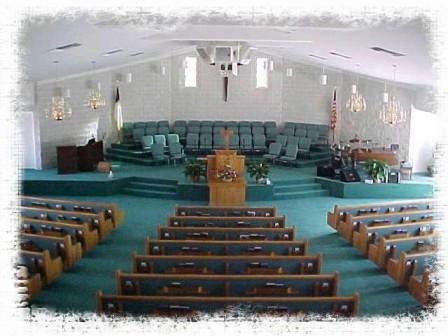
Actually, I won't miss it at all. The "house of God" is not a church building. God dwells in men and women, boys and girls. We the people are the tabernacle of His indwelling Spirit. This is the focus of the entire New Covenant. And it is the reason why it is so destructive to call the church building the "house of God."
In many a church meeting one often hears a prayer that goes like this: "Thank you, God, for allowing us to meet in your house on this Sabbath day to worship you." There is only one thing wrong with this prayer. Actually three things.
1) The church building is not the house of God.
2) Sunday is not the Sabbath day.
3) The purpose for the assembling of the church is mutual edification, not worship.
In my opinion, nothing has been more misleading and more destructive of the message of the New Covenant than the belief that the "house of God" refers to a building! So, I will not miss being in the "house of God" today. But I will miss being with the household of God!
8:22 AM Conclusions #10-11 (from Paul, Apostle of Weakness):
#10: Even in the Corinthian letters, several instances of the terms are used in the ordinary secular Greek sense without any specific "Christian" or "Pauline" connotations. Yet those places where he employs the words without any distinctive meaning are still an important aspect of the Pauline motif.
#11: Because weakness directs him away from himself and to God, Paul can, and often does, assert the positive meaning of weakness.
8:06 AM And the winner is ...
James Boris of Corning, New York
He was the first to come up with the correct answer: Dirk Willems. James beat out the next contestant by a mere 15 minutes.
The next question is this: Why did Dirk Willems turn back? The answer to that question is found in this outstanding essay by Joseph Liechty. You'll want to grab a cup of coffee and read the essay in its entirety. It's yet another reason why I love the Anabaptists.
Congratulations, James! Your book will go out in Tuesday's mail.
7:22 AM Speaking of books, and since we're all snowed in today, let's have ANOTHER CONTEST! The prize will be one of the following books of mine (you chose):
-
The Myth of Adolescence
-
The Jesus Paradigm
-
Christian Archy
-
New Testament Textual Criticism
-
Rethinking the Synoptic Problem
Here's the question:
Who is the Anabaptist depicted in this famous picture?

The first one with the correct answer wins the prize!
7:16 AM I don't know why I wasn't included in this video series about theological libraries. I mean, I must have at least 350 books in my office library. Well, better make that about 300. I just gave a bunch away to a Bible school in El Salvador. Man, do I love books! Man, do I love libraries where I can access books for free even more!

7:07 AM This piece at the Christian Science Monitor on land disputes is an insightful guide to understanding why warfare is so common in Africa. But not only in Africa. Reading A Terrible Glory: Custer and the Little Bighorn last night I noticed this explanation of why the U.S. government and the American Indians were at odds so often:
From the very beginning, the Europeans, with few exceptions, had perceived America's native inhabitants as no more than savages -- romantic, perhaps, in their primitiveness, and occasionally charming, or worthy of pity, but savages nonetheless. Whites had little respect for Indian cultures, their ways of life, or their concepts of government and landownership -- the latter being particularly antithetical to white views. Indians did not develop the land, nor did they measure and mark what they owned; they simply did not understand land as private property. One could no more own the earth than the sky, the Indians reasoned. Rather, their land was commonly owned and used. To the ceaselessly toiling New World colonists, whose way of life was rooted in property ownership, this outlook was positively sacrilegious. This difference, more than anything else, would lead to the struggles between the two peoples (pp. 12-13).
The Whites, of course, were Protestants for the most part who believed in the work ethic and the idea that the accumulating of things (including lands) was a good thing, an indication of divine blessing. They therefore eagerly wrested North American territory from the Indians any way they could -- by treaty, by purchase, or by sheer force. The means did not matter. Americans had a divine right to the undeveloped West, a right first enunciated in a New York newspaper, the Democratic Review, in 1845, called manifest destiny.
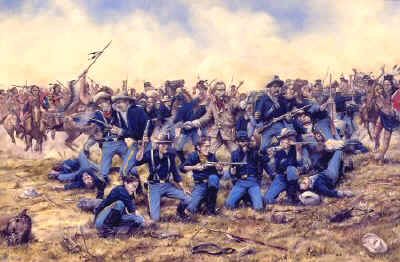
Robert E. Lee once said, "It is history that teaches us to hope." I sometimes wonder if that is true. "Divine injunction" was the cause not only of the Indian wars in the late 1800s. A case could be made that Americans still think they can apply the concept to the modern world-at-large.
6:55 AM Yet another blogger asks Is Tithing Biblical? I see Henry Neufeld has also entered the fray. Jump on in and join the discussion!
6:47 AM Quote of the day (Ted Gossard):
Living well means living in relationships. God is relational in his Being as Trinity: Father, Son and Spirit. And God has created humanity to inhabit a good earth as relational beings: to him, and to each other. To live well then means we need to invest ourselves in relationships. First with our families: our spouses, children, parents, siblings. And with others: our neighbors, brothers and sisters in Jesus, and enemies included. We love others as ourselves, and we learn to love in the way of Jesus, as Jesus loved. By living sacrificially for the good of others.
Read Living Well.
6:40 AM Much ado has been made over the pope's injunction to go forth and blog.
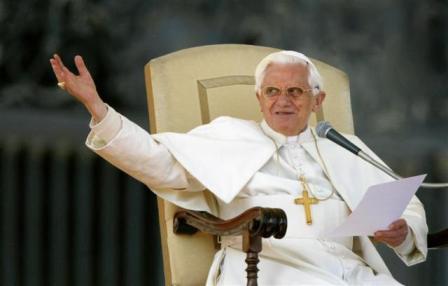
But he's right. If you're not blogging, you're missing out on the world's least expensive and most effective means of communication. If you do decide to jump on the band wagon, here are 10 tips to help you get started:
1. "In the beginning, God…" (Gen. 1:1). If the Bible begins with God, so must we. We will never be able to do what He wants us to do unless we are prepared in advanced. How foolish to think we can do anything for Him without Him. Start every day, and every blogging session, with prayer.
2. "Therefore I have set my face like a flint…" (Isa. 50:7). Elsewhere Paul says, "This one thing I do…" (Phil. 3:13). Let us make up our minds on this one thing: to magnify the Lord Jesus in everything we write. We must make it clear that we do all Soli Deo Gloria – to the glory of God alone. Let Christ be preeminent and all-inclusive in our writing, in word and in spirit.
3. "And they, continuing daily…" (Acts 2:46). It takes a lot of grace to do something every day, but it is in the monotonous trudge that we ply our trade.
4. "Do not fear …" (Rev. 2:9). Our supreme business is not survival or success or self-satisfaction. What matters is stewardship. Don't be fearful of pseudo-Christianity, false orthodoxy, or simulated piety. Be faithful and not fearful.
5. "Although the fig tree may not blossom…" (Hab. 3:17). We have no Pollyanna God. Often we will face grim, hard times, and if we cannot transform them we can transcend them and praise God anyhow. When things don't make sense and demons dance with glee, say "Hallelujah" and blog anyway!
6. "Will you also go away?" (John 6:67). Today people want a political kingdom of prosperity but have no appetite for Jesus' real message and mission. Jesus gladly thinned His crowd, and when they departed He did not change His message to bring them back. Be prepared for a thinning crowd but also for a faithful remnant of devoted readers.
7. "The day will reveal it" (1 Cor. 3:13). Except the Lord build the blog we labor in vain who build it. But He who has begun a good work among us will complete it. Give it your best in view of that Day when everyone's work will be manifested.
8. "But when he was strong…" (2 Chron. 26:16). As long as Uzziah sought God he prospered. But when he was strong his heart was "lifted up to destruction." We don't collapse in a time of failure but at the peak of success. So, "Let those who think they stand take heed lest they fall" (1 Cor. 10:12). Beware popularity!
9. "Well done…" (Matt 25:23). Notice that Jesus said "Well done." A good and faithful servant's work is not merely done, but done well. Every time we write there will be wood, hay, and stubble, but our desire must always be to build with gold, silver, and precious stones. My builder son takes pride in his work like the old craftsmen and artisans who turned out flawless masterpieces. Something of the same spirit must enter our spiritual labors. There is much shoddy Christianity today, but low-grade effort is not acceptable. Ask yourself at the end of the day: Was my work merely "done" or done "well"?
10. "And the Lord shut him in" (Gen. 7:16). God both opens and closes doors. He opens and shuts the doors of Christian service as well as the door of salvation. Someday He may shut the door to our blogs. The important thing will be to be on the right side of the door like Noah when that happens.
Happy blogging!
Saturday, January 30
8:10 PM (Tragic) quote of the day (Andrew Young):
Gifted, charismatic and mesmerizing, John Edwards knew what was right but was so blind to his own flaws – narcissism, greed, power and lust – and so determined to hide his shame even from himself that he couldn't correct them.

We men can be such blockheads. We want a place and a name in life. We want fulfillment. We want love. If we can't find it at home, we'll find it elsewhere. Defection always follows rationalization. Rather than obeying Spirit-prompted conviction, we willingly go our own ways. There is no reason to think that what happened to Sen. Edwards can never happen to any one of us. We are so totally (and sinfully) confident in ourselves that we don't give God the chance to do what He does best in our lives. Pity Edwards. Pity his wife. And pity those who think it could never happen to them.
May God help us all to remain faithful to our marriage commitments.
7:22 PM Eric Carpenter has been enjoying reading good biographies these days. Oddly enough, Becky has been reading the biography of Amy Carmichael,

while I have been ensconced in Dabney's classic biography of Thomas Jonathan Jackson. Today I got as far as the Battle of First Manassas (First Bull Run).
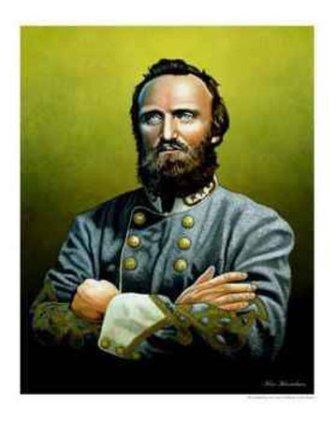
Perhaps one of the best missionary biographies I have ever read is The Lapsley Saga, mainly because Samuel N. Lapsley was a pioneer missionary to the Congo (not to mention the fact that my wife, Becky Lynn Lapsley Black, is related to him).

After his death from blackwater fever, a friend wrote to his parents: "I dearly loved your son and regard him as a real martyr. I warned him to go home, but he wished to complete a definite work before doing that." Then he added, "He had too much goodness for his strength!" What a wonderful testimony to the grace of God.
What good biographies have you read lately?
6:35 PM Just finished reviewing the best little Latin grammar ever written: Legendo. "Our plan is to learn by reading. Legendo discimus" (p. 15). I agree! "All that is necessary is concentration, the determination to persevere, and a regular daily application to the readings and explanations given" (p. 12). Amen! Did you see that word "daily?" To my doctoral students out there: please take that word to heart. Unless you are reading your German and French every day you will never master these languages. Never. Guaranteed. This free helpful tip on language learning is brought to you by your good friends at DBO.

6:22 PM Glory be! Someone has actually quoted the fathers in relation to the origins of the Gospels. Regarding the supposed contradiction Matt finds (was Mark written before or after Peter's death?), I have an opinion, which may be found here if you're at all interested.
6:17 PM I figure we got about 8 inches of snow. The dogs are enjoying romping. Next up -- the big freeze. Temps will be in the single digits tonight and the roads will be impossible tomorrow. Thank God there were no power outages in the Piedmont.
10:10 AM Conclusions #8-9 (from Paul, Apostle of Weakness):
#8: Paul can use the terms in a favorable or unfavorable sense, depending upon the context, so that precise determinations of the meaning will always require close attention to the immediate setting. However, the distinctively pejorative use of astheneia is represented only in the mouth of Paul's opponents.
#9: Although the words have a distinctive place in Paul's theological and ethical vocabulary, they do not constitute the core of his gospel; rather they are used to defend and to illuminate that core.
9:38 AM Goal for today: Review the complete Latin verb system.
9:35 AM True confession time. When I read this post over at Evangelical Textual Criticism I stumbled over the word Tartu. I honestly did not know where that was. Still wouldn't know had I not Googled it. Even my spell check didn't recognize the word. You learn somethin' new every day!
9:22 AM Becky grew up in a home where Monopoly was played frequently.

Personally I have never enjoyed the game, have had no interest in it whatsoever -- until today.
In 1941, the British Secret Service asked the game’s British licensee John Waddington Ltd. to add secret extras to some sets, which had become standard elements of the aid packages that the Red Cross delivered to allied prisoners of war. Along with the usual dog, top hat and and thimble, the sets had a metal file, compass, and silk maps of safe houses (silk, because it folds into small spaces and unfolds silently). Even better, real French, German and Italian currency was hidden underneath the game’s fake money. Departing allied soldiers and pilots were told that if they were captured they should look out for the special editions, identified by a red dot in the Free Parking space. Any sets remaining in the U.K. were destroyed after the war. Of the 35,000 prisoners of war who escaped German prison camps by the end of the war, “more than a few of those certainly owe their breakout to the classic board game,” says Mr. McMahon.
Read World War II Weapon: Monopoly With Real Money.
8:58 AM For anyone wanting feed updates on my blog, check this out. (Seems a bit boringly repetitive to me, but I appreciate whoever made the effort to do this.)
8:53 AM Anti-war Republicans? That's not an oxymoron, says Justin Raimondo at The American Conservative.
8:44 AM I've finished reading Lee: The Last Years. One quote from the book haunts me. Lee said to his former general Richard Ewell, "For my own part I much enjoy the charms of civil life, and find too late that I wasted the best years of my existence" (p. 175). This sentiment on the part of Lee is confirmed by something his great-grandson, Robert E. Lee IV, wrote in the foreword to David Eicher's Robert E. Lee: A Life Portrait: "After the surrender at Appomattox, General Lee took the presidency of Washington College and settled in Lexington, Virginia, where he lived the remainder of his life. Demonstrating his compassion for students and a genuine desire to educate the next generation, Lee made perhaps the greatest contribution to society in these final five years of his life" (p. x).
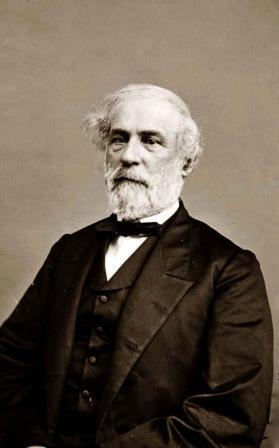
I would never have imagined that the great military hero of the South, who is remembered for his battlefield exploits, would be honored for his contribution to society as an educator. In fact, the man who was once the superintendent of West Point would say after the war, "The great mistake of my life was taking a military education" (Lee: The Last Years, p. 156).
The one common denominator I find between the Lee of the Army of Northern Virginia and the Lee of Washington College is his sense of duty. He is to be emulated for that reason. This is not to say that I agree with those who try to make Lee an unblemished icon who never made any mistakes. Still, Lee's more attractive qualities -- his Christian humility, his tactfulness and sense of duty, his selflessness -- have earned for his portrait a place on my office wall. There is much to admire in Lee's character, even if there remain questions about his military performance or his convictions about this or that.
On our farm we have an old cemetery. Buried there is the former owner of Rosewood, Anderson Boyd. On his gravestone are these words: "Corporal, 59th Virginia Infantry." Some day I will be buried next to him. That will be perhaps a supreme irony. I have no southern roots, unlike Becky, whose ancestors fought for the Confederacy during the War of 1861. During that era my family, the Millers, were eking out a living farming along the banks of a creek in Western Maryland called the Antietam. German pacifists, they were witnesses to the single most bloody day of that bloody war in September of 1862.
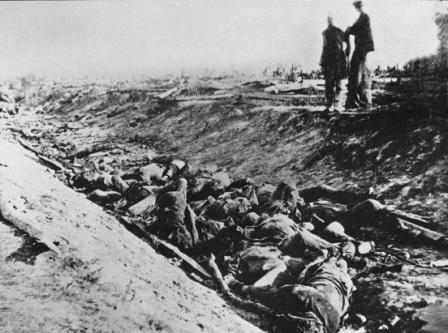
My readers know my stance about war and the war-mongering I believe a nation can be guilty of. Yet I have to admire any man who would sacrifice so much to do what he believed was his duty -- defend home and hearth against foreign invasion. I do not worship Lee or the Cause. But I am honest enough to admit that I admire in him what has often been lacking in my own life: dogged perseverance, humble trust in God, and commitment to duty. I too am finding in my latter years a renewed sense of calling to "do good and share what you have," as the author of Hebrews puts it.
Several years ago I ran across an essay by Averell Harriman. As he was leaving for France as ambassador from the United States, someone asked him, "How's your French?" "Oh," he said, "my French is excellent, except for the verbs." Here is a great truth I am learning. I do not believe the New Testament allows the church to give ultimatums or proclamations on political problems. We are called to love all people everywhere and to show this love in definite, practical, and helpful ways. We must be deeply concerned about those who are oppressed, troubled, underprivileged, and Gospel-less. We are called to a readiness to apply in specific contexts the love of God by deeds of kindness and help. This is true whether the needy are here in America or in some foreign land.
I am asking God to give me a heart of service, a sense of duty to walk the walk and not just talk the talk. As Christians, let us not wait for others to come to us. Let us assume the initiative.
7:42 AM A study suggesting that going barefooted may lead to healthier feet has got me shaking my head. I never wore shoes in Hawaii and the result has been fallen arches and constant discomfort. As for going barefooted making one feel more "spiritual," well that's just pure nonsense. Everybody knows that wearing shoes is biblical (cf. Mark 1:7).

7:23 AM A gentle snow is falling and I am sipping coffee. Thank you Jesus for simple pleasures.
Friday, January 29
9:20 PM While rummaging through a cupboard this evening Becky and I ran across our old high school and college year books. That's a big NO-NO. I haven't been able to put them down. I keep thinking, "Whatever happened to so-and-so?" And we both look so young!
9:12 PM Nate and I are kicking ourselves for having thrown away two old toilets this afternoon. With a little work we could have made musical instruments out of them.

Note the nifty foot-operated lid-lifting device. Imagine the "wa-wa" effect that could give!
7:10 PM Oh, the things students will do to their professors!
6:51 PM Troy's response reminded me of a cordial debate I've had with some of my New Testament colleagues (once with Scot McKnight at an annual SBL meeting) in which we've discussed whether Mark's grammar contains grammatical "errors." The answer depends, of course, on one's definition of "error." For example, I have argued that Mark's use of the middle voice of phulasso in Mark 10:20 is hardly a case of "incorrect grammar" that was "corrected" by Matthew and Luke into the active voice. What we have is merely a matter of style. In the German example below, the use of the German "Esset" in certain words is now required by grammarians, even though in some German-speaking countries the double "s" is still acceptable. Does one follow usage here or the grammar books? This same question raises it ugly but unavoidable head in discussions of biblical Greek. It's the ago-old problem of prescriptive grammar versus descriptive grammar. Both have their place, but I'm still not convinced that Markan diction is erroneous.
By the way, a synopsis (in Spanish) of my Filologia Neotestamentaria essay "Some Dissenting Notes on R. Stein's The Synoptic Problem and Markan 'Errors'" may be found here. The synopsis concludes as follows:
El autor resume lo dicho en las siguientes pautas:
l) No hay reglas rígidas sobre el uso del lenguaje. Éste depende de la situación, intención del autor, lugar y tiempo.
2) Hay que tener siempre presente la distinción entre los niveles culturales del lenguaje, que son sociales, y las variaciones funcionales, que dependen de la situación. Puede quizá justificarse el intento de determinar el nivel cultural del estilo de Marcos, pero para los estudios sinópticos no se gana nada argumentando a partir de variaciones funcionales, como la voz de fullássô.
3) El lenguaje de cada evangelista es un idiolecto. Las diferencias no son errores; la idea de «error» nace de la insistencia en la rigidez gramatical, sin reconocer la relatividad del lenguaje.
4) Habría que analizar, más que palabras aisladas, pasajes extensos; el análisis debería tener por punto de partida la macroestructura del texto.
6:30 PM We have a winner! Troy Bacon writes:
Dear Dr. Black,
I have only been studying German for about a month, but I believe the misspelled word in the phrase posted on your blog is ¨anstössig¨. Since it is in lower-case, the sharp-S should be used instead of the double-S. The correct lower-case spelling would be ¨anstößig¨.Sincerely,
Troy Bacon
This was my response:
Good job, Troy! Although some might nitpick, it seems you are correct (according to this entry):
Bei „anstössig“ handelt es sich um eine andere Schreibung von anstößig, die nur in der Schweiz und in Liechtenstein zulässig ist. In den anderen deutschsprachigen Ländern ist sie nach den aktuellen amtlichen Rechtschreibregeln vom 1. August 2006 nicht korrekt. Alle Informationen befinden sich daher im Eintrag „anstößig“, Ergänzungen sollten nur dort vorgenommen werden.
http://de.wiktionary.org/wiki/anst%C3%B6ssig
Of course, the answer I was looking for was "Gotes" (which should be spelled "Gottes"). Please send me your mailing address and I'll put the book in the mail. Congratulations!
Dave
The book will go out on Tuesday.
6:06 PM One of the rare points of world unanimity is our hatred of Iran. But wherever we have unanimity, we have to be very suspicious. Iran seems to be everyone's favorite scapegoat for all the evils in the Middle East. What is going on there is unbelievably evil, but it's no worse than the abuses one can find in our "ally" Saudi Arabia. The same White House that can condemn Iranian executions is strangely silent about our own military's killing of innocent Afghanis. It's pointless to accuse only Iran of imperialism, because American, Chinese, and Russian imperialism are just as powerful forces at work in the world. Why should we blame other nations for wanting to act like us? They are just as hungry for power and wealth as we are.
Every time we condemn some foreign power for abusing its power without at the same time admitting where we have fallen short is a chance for the truth to come back and haunt us.
5:54 PM Looks like the years of deceit have come full circle with Tony Blair's insistence that the Iraq War was caused by WMDs (see the series of BBC reports here). It's all there again: good versus evil, democracy and freedom, and supposed weapons of massed destruction.

What is perhaps most interesting to me is the large number of American evangelicals who apparently go along with this nonsense. For them, Islam has been substituted for the Evil Empire. They see war in the Middle East in prophetic terms -- a battle between the righteous and evil. Even their defense of the indefensible -- torture -- seems to be biblically driven: insurgents are unworthy of basic human rights since they are seeking to destroy ours.
Today Justin Raimondo (in his essay The State of the Empire) reminds us that every world-dominating power from ancient Rome to the British Empire has been brought down by a foolish combination of global overreach, military religion, and diminishing resources. He is absolutely correct. Despite America's "exceptionalism," God may eventually spurn His Republican faithful. One day America will go the way of all nations. Mr. Obama admitted as much in Wednesday's SOTU speech, though unwittingly, when he said that the U.S. debt predicament and vulnerability will only go from bad to worse. What he forgot to mention is that countries can and do go broke. America may well be the next example of what happens when hubris replaces common sense and decency in a nation.
3:48 PM Contest Time! Here's a little assignment for all of you budding German readers who have blogs. Can you find the misspelled word in the following quote from the Theological German site? The first blogger to send me the correct answer will receive a free copy of Christian Archy.
3:45 PM The lives of many Christians are impoverished, argues Alan Knox in a post titled Drawing Lines, because of their failure to grasp the reality of their spiritual position in Christ. Every church I know of is far from perfect. They all make mistakes. They all have inconsistencies and hypocrisies. And each has a problem with theological perfectionism (We are the true church!). But you will not improve these churches by refusing to fellowship with them and setting up shop on your own. God save us from our hubris and pride!
3:20 PM Reading Eric Carpenter's latest post about the Great Commission is another reason why I love the Internet. His conclusion?
Like Jesus, we need to go to those who hate us and tell them the good news.
A Christian, in other words, is a disciple who acts like Jesus. It is idle for us to boast "I am saved" and fail to obey Jesus' commandments, including the one about loving our enemies. This very day God is calling Dave Black, in the light of the cross, to be willing to lay down his life for others. He is also calling me to do what is perhaps even more difficult -- to sacrifice self. May He give me a heart of obedience!
3:02 PM Had another good treatment at the hospital. Becky's now resting. Should be a quiet weekend. I imagine we'll be snowed in. I hope to do last minute preparations for my classes next week. Blessed to be part of such a Christ-centered seminary.
10:00 AM Ah, I feel great. Nothing like an hour of hard exercise. I made up a saying this morning: "A trailer a day keeps the doctors away." How do you like that?
Speaking of working out, I read the following exercise tweets recently:
-
Pastor of small country church: "Just had a long walk."
-
Senior pastor of mid-sized church: "Just back from the gym."
-
Senior pastor of mega-church: "Just met with my personal fitness trainer."
I reckon the professional ministry has some advantages after all.
Right now we're off to UNC. This afternoon I need to make a trash run with Nate and then prep the fireplaces for the snow storm we're expecting tonight. There's always the chance that the power will go out, and we live (literally) at the end of the line.
Have a good one wherever you are!
8:34 AM The boss man just arrived so I gotta boogie. More manure to muck (yes, my emailer friend, with a pitch fork!).
8:21 AM This semester I'll be doing more than teaching Greek. My goal is to train my students to think biblically -- and to think on their own. All too often we take an a priori approach to the New Testament in our study of soteriology, ecclesiology, etc. The result is that the biblical text is sometimes overlooked and its concepts blurred. In the spirit of Paul ("you're doing well but you can always do better") I hope to explore with my students the underlying presuppositions that are of paramount importance in biblical exegesis. For example, a cardinal question concerns ordination. In the New Testament, the church was a brotherhood of believers. But by the third century all this had changed. The charismatic ministry began to give way to a hierarchical and institutional church. In the New Testament, no ministerial "office" (the word is never used for positions of leadership) implies status or position in the secular sense; the influence of leaders is always measured by their Christ-likeness and the degree to which the Holy Spirit is active in their lives. The Spirit gave them the gifts and abilities needed to serve the Body at large and to represent their collective concerns. But a two-tiered clergy-laity division never existed. Leaders were extensions of the Body, not a special class set over it. But the bottom line is this (and this is a point that is often overlooked): The essence of any church ministry is that of service in the spirit and pattern of the Lord Jesus. If a church -- any church -- loses that sense of Christ-ministry is ceases to be the church and becomes secular, basing its methods on the kingdom of this world.
Another glorious yet often overlooked truth is that the church is, essentially, a mission body. It is a mission body before it is anything else. Therefore, in order to fulfill its world-wide mission as commanded by Jesus, its structure must be a mission structure. There is no possible logical reason for a church to have within it a separate "missions committee," just as a seminary that calls itself a "Great Commission" seminary would do well to rethink its philosophy of having a separate missions and evangelism department. When it is understood that every believer is a fulltime missionary and that every believer is necessary within the church's life and witness, churches will be revolutionized to become what they are in essence: a witnessing community. They will no longer seek after the "world-wise" wisdom of this age that focuses on "relevance" to the exclusion of the Good News of the kingdom. The Head of the church wills the growth of His church, but when the whole church ceases to perform its function and assigns the roles of "missionary" or "evangelist" to certain specially "called" individuals, something fundamental is lost.
Thus, in teaching Greek, I am concerned basically for the renewal and growth of not only my church but all evangelical churches in these exciting days. My goal is to see every one of my students realizing their full, God-intended potential in the kingdom, even if they never enter so-called "fulltime Christian ministry." The God who speaks to us in the pages of the New Testament must be given full reign. Revelation must no longer be understood as dogma so much as divine action. We must move from an emphasis on the concept of Christologos to that of Christophoros -- from being Christ-talkers to Christ-bearers. I greatly appreciate the effort my students put into learning the Greek language, but all will be for nothing unless they take this next step.
7:47 AM This morning I've been reflecting on the past year, 2009. It was a year of jarring surprises and unexpected blessings. B and I entered uncharted territory and we still feel the aftershocks: Jessie's difficult labor and delivery; my hospitalization for malaria; Becky's cancer diagnosis. What lessons did I learn? Scratch that. What lessons am I learning? Even after 56 years on this earth I feel like I am just starting out on the path to knowing God. Here are a few baby steps I've taken:
-
I've learned that I cannot control my life.
-
I've learned that the world is too uncertain a place to count on it.
-
I've learned that life must always reflect God's character.
-
I've learned that I can't wait for wounds to heal before I serve God with abandon.
-
I've learned that cold dogmatism has no place in Christianity.
-
I've learned that the goal of life is to love God and serve Him by loving others.
I still struggle in each of these areas. I am learning to seek God with all my heart and not only my mind. Christ wants me to love as He loves, not in a condescending spirit, still less in a self-centered fashion. We in the Christian community must discipline ourselves to listen to each other. We must admit that our opinions and even our dogmas are often self-serving themes in our patterns of relating. I am ready to move beyond that. I am ready to go back to the simple truth of John 13. I am ready to be nothing more than a foot-washer.
Thursday, January 28
9:42 PM We all had a delightful evening. My spaghetti turned out to be edible. Nate, Jess, and Nolan joined us, so I had all 4 boys with me tonight. Took gobs of photos but -- alas! -- can't post them because our HP program was corrupted. Maybe next week. I tell you, that Nolan is getting so big. He now sports 10 teeth, and this evening I saw him crawl for the first time. (Proud grandpa moment!) I just tucked Becky in and we said our evening prayers. Right now I'm settling down to read William Taylor's first person account of the Battle of the Little Big Horn. His book is called With Custer on the Little Bighorn and is a terrifying read.
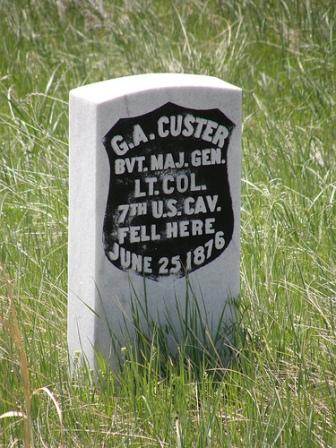
5:14 PM If you live in the northeastern United States, do yourself a huge favor and check out the ETS regional meeting to be held March 26, 2010 in Lancaster, PA. It features one of my all-time favorite authors, Donald Kraybill, whose book The Upside-Down Kingdom is a classic work of Anabaptist theology. A must read book and a must hear lecturer. Handsome too! (Note beard and hairline.)
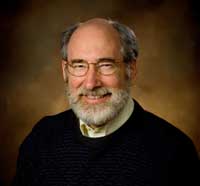
4:58 PM Just got this email. Too funny!
Dr. B, I just had to comment on your blog post,
"Just back from mucking out a huge trailer of manure with Nathan (Is that more efficient than using a shovel or pitchfork?) and am about to load 80 bales (Who ordered bales of manure????) for delivery to Berea, NC. I'm thinkin', boy do I enjoy farming."
Hope you get a chuckle from my "reading".
I did indeed, I did indeed. Reminds me of something Paul once wrote: "I gave you milk to drink and not meat (to drink???)."
4:42 PM Greetings one and all! It was a wonderful day at UNC and it's gonna be an even wonderfuler evening. Three of our grandsons are coming to dinner (along with their mom and dad), and guess who's cooking? That's right! This time it will NOT be Chinese food, however. You'll have to wait and see what I'm concocting but it WILL be good. Once again I'm so grateful for the excellent care Becky is getting at UNC. We could not have asked for better doctors, nurses, and staff.
10:15 AM Just back from mucking out a huge trailer of manure with Nathan and am about to load 80 bales for delivery to Berea, NC. I'm thinkin', boy do I enjoy farming.
9:11 AM Only 7 short weeks before we leave for Ethiopia. Please pray with and for us that B's white counts will allow us to go.
8:58 AM A warm welcome to all the new students who will be joining my beginning Greek classes this spring semester. Most of you have used a different grammar than the one we're using, so please be sure to review the first 13 chapters of Learn to Read New Testament Greek before starting class next week. You may find our approach to verbs a little bit different from what you're used to, so concentrate on the verb chapters (3, 7, 10, 12-13). And remember: If I can help you in any way, don't hesitate to email me at dblack@sebts.edu. Can't wait to meet you and to get started!
8:38 AM Quote of the day #3 (Arthur Sido):
Of course plenty of really dangerous and kookie teaching comes from academic institutions too, so having a PhD is not a safeguard against heresy.
Read Three Cheers for Greek Geeks!

8:14 AM Quote of the day #2 (Eric Carpenter):
One another requires "we" as opposed to simply "I."
7:45 AM Yesterday my good friend and fellow-worker in Ethiopia Jon Glass gave me a copy of Seventy-Five Problems with Central Baptist Seminary's Book The Bible Version Debate. The book claims to be "a handbook for answering King James Bible critics." Thanks Jon. I needed that like a hole in the head. To top it off, Jon himself is no defender of the KJV-only view. I think he was just getting even with me for pointing out his recent lack of blogging.
Below: Brother Jon passing out Bibles in Burji.
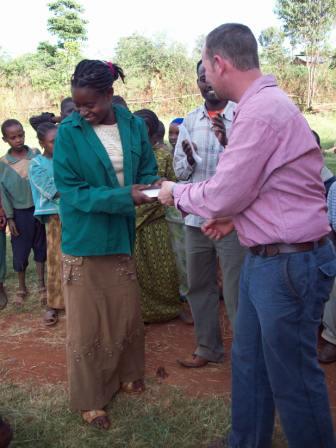
We've distributed thousands of these Bibles to those who have memorized 9 passages of Scripture in Amharic (we provide the Scripture passages). And to think: One Bible costs only $5.00. For more on the Lord's work in Ethiopia, including the needs for our Galana clinic, please see our Ethiopia Files.
7:25 AM Conclusions #6-7 (from Paul, Apostle of Weakness):
#6: Paul develops the words into a major theme only in the Corinthian letters, where weakness plays a significant role in the Pauline apostolic defense. In 2 Corinthians, where the attack against Paul is at its strongest, the largest complex of weakness language in Paul is to be found.
#7: The Sitz im Leben for the motif is provided, at least partially, in Corinth and the Corinthian correspondence. Especially the argumentative situation of l and 2 Corinthians seems to have been the primary controlling factor in Paul’s use of weakness terminology. Here Paul shows a tendency to borrow the terms from his opponents and then to define them in terms of his own theology.
7:18 AM Becky has now completed 21 out of 35 radiation treatments. I'd say that calls for a bit of celebration, wouldn't you? So here we go everybody. Hip hip! Hip hip! Hip hip!

P.S. Yesterday Becky baked pound cake for her nursing staff at UNC, her radiation techs, the receptionists, and the parking attendant. I tell you, that woman puts me to shame.
7:11 AM The great soccer coach Bill Shankly once denied that soccer was a matter of life and death. "It's much more than that, " he said.

One of the ways I've changed the most in the past several years has been in my attitude toward sports. Once an avid basketball player and a huge Rams and Lakers fan, now I find that I have no interest whatsoever in professional sports. I couldn't tell you who is playing in the Super Bowl this year if my life depended upon it. Honestly.
This change in perspective is just a small part of my life that I'm finding very puzzling. If my attitude towards something as temporal and passing as sports needed adjusting, I shudder to think of what other areas of my life have needed it too. The resolute application of Matt 6:33 -- Seek as of first importance the kingdom of heaven -- is the only way forward towards the creation of new hopes and priorities. No doubt there is nothing wrong with enjoying sports. For many of my friends, watching football on TV is an entertaining avocation that provides a break from the monotony of life, much as reading World War II escape stories is for me. But there is no real comparison between the battle taking place on the football field or in a book about WW II and the scheming ploys of our arch enemy Satan. His overmastering aim is to get our eyes off Jesus, to twist and distort our perspective on life so that what is good replaces what is best and of ultimate value and importance. Watching sports on television (or reading good books) carries the great potential risk that we will end up wasting away our lives in inconsequential activities. To the servant who was wasting his goods, the rich man in Jesus' parable says, "What is this I hear about you? Turn in your account of stewardship!" (Luke 16:1-2). Paul puts it like this: "Each one of us will give an account of ourselves to God" (Rom. 14:12). If we are Christians, none of us has the luxury of saying, "I am excused from my responsibility to use the gifts God has given me."
So the question is this: Am I taking full advantage of the time God has given me? Time is a precious commodity. Its stock is limited. I need to manage it well, and that includes how I manage my leisure. Someone has said that by the time teenagers leave high school they will have watched 350,000 commercials on TV. In terms of a Christian's stewardship of time, that's surely a mite too many. But I need to add a careful rider here. Television is not the only time-stealer. How much do I read on the Internet that is really worthwhile and beneficial? Personally speaking, I have stopped reading so-called Christian bloggers whose main purpose in life seems to be to expose the moral failures of others. I call these blogs narcissism factories. They bloat their writers' egos and smother their insecurities under a hubristic penumbra. Their message is as obvious as a Texas two-step: Either you're moral (like me), or you're not. They fail to realize how profoundly unbecoming it is to disclose the dark imperfections of their fellow human beings. "That blogger whose richest pleasure depends on exposing the sins of others -- what secret sin is he or she guilty of?" -- I often wonder. There is something terribly wrong when our blogs shine more brightly than our Savior and when our passion for holiness is replaced by a passion for haughtiness. By working to weaken bad passions we only succeed in increasing them. I struggle enough to maintain perspective without having to read Christian tabloids. I mention this personal disclosure because my experience, I think, is not uncommon.
In this post I have raised some very personal questions, and these will require some very personal responses. But one thing is certain: We must all appear before the judgment seat of Christ. And there will be different rewards we receive, not according to the measure of our gifts, but according to their use.
6:27 AM Quote of the day (from Lee: The Last Years, p. 35):
Their third day on the road brought them to the house of Charles Carter Lee, his eldest brother. He dined with them that night, but insisted on sleeping in his tent. It was a continuation of his practice during the war; he wished always to share the field conditions his soldiers must experience. With a literary shake of the head, his aide Taylor wrote of Lee's doing this even now: "The continued self-denial can only be explained upon the hypothesis that he desired to have his men know that he shared their privations to the very last."
That's leadership. As Christians we learn by the example of others. Teaching is not the dissemination of information. That's part of it, but only a small part. What I say in the classroom doesn't matter one iota unless it is backed up by my life. How can I tell my students they must live radically for the Gospel unless I am living that way? How can I tell them to read through the entire Greek New Testament in one semester (as I am doing in my Intermediate Greek class) unless I do that assignment along with them? Christian education is likeness education. So is leadership on the battlefield. No wonder Lee's men called him "Uncle Robert." No wonder they followed him into impossible situations. No wonder they stuck with him all the way to Appomattox.
As Christians, we cannot be content to talk about the Bible, argue over it even, while the world perishes. We cannot be content to analyze the Gospel, tuck it in our pockets, and then go on our business as if nothing has happened. The Gospel is not a matter of truth only. It demands that we incarnate it, just as Jesus did. I've said it before but it bears repeating: If your goal in studying Greek is to become a famous "scholar" who evades the lordship of Christ and His call to be wise fools, then please take Greek from someone else. Ultimately, I teach Greek so that the message about Jesus as recorded for us in the New Testament might be obeyed, not simply understood. Jesus is exalted Lord of the whole world, and He calls into existence a single worldwide family.
What am I doing this very day to serve Him and that family? That is the question.
Wednesday, January 27
10:53 PM It's way past 10:00 pm and we just returned to the farm after leaving the house at 11:00 am. Becky had her blood drawn at UNC and then her radiation, after which we had dinner with some friends who live in Durham and attended their Wednesday evening prayer service. This church has been a huge partner with us in the Lord's work in Ethiopia and I was thrilled that they asked Becky to give them a 10-minute update on the Burji clinic. After that we drove to Wake Forest to pick up my tower which, as you can see, seems to be working again, though there are still several outstanding issues that need to be resolved, including replacing the mother board. I'll know for sure in the next few days, but in the meantime I just want to send a huge THANK YOU to brother Jerry at the seminary for taking time out of his busy week to assist us with our computer issues. He found a nasty virus that corrupted several programs on our computer, was able to fix them, and also trouble-shot for us. I hope to return to blogging tomorrow, but just wanted you all to know that we're back -- I think!
Monday, January 25
4:29 PM Quote of the day #2 (Robert E. Lee, one month after Appomattox):
I know you sorrow for us, but you must not be too distressed. We must be resigned to necessity, and commit ourselves in adversity to the will of a merciful God as cheerfully as in prosperity. All is done for our good and our faith must continue unshaken.
4:21 PM Quote of the day:
Cases of illness among Christians in NT times indicate that the apostolic commission to heal (cf. Mark 16:18) could not be effected indiscriminately to heal oneself or one's friends. Normal means of healing were available for Timothy's gastric problem, for instance; and even in the company of Paul Trophimus became too ill to travel any further. The classical Pauline passage on illness (2 Cor 12:7-10) is in this respect most striking of all, in that Paul’s "thorn in the flesh" remained with the apostle despite even the most intensive prayer for its removal. Paul states three reasons for its existence: to keep him from becoming proud because of his revelations and visions (v. 7); to enable him to experience the power of Christ (v. 9); and to teach him the true purpose of hardships, persecutions, and personal difficulties (v. 10). Indeed, the entire passage is concerned more with the power and grace of the Lord than with the weakness of the apostle.
Physical infirmity is evidence that the body "is sown in weakness" (1 Cor 15:43) and is a cogent reminder of the creature's dependence upon the Creator. In this respect, the case of Paul is remarkably like that of Jacob, who learned to depend totally upon God only after he had been inflicted with a physical injury (Gen 32:24–32). These instances of illness show that the real issue in the matter of human suffering is our relationship to God rather than our own physical condition, as painful as it may be.
Source: Paul, Apostle of Weakness.
Saturday, January 23
9:10 PM They say there are five Gospels. Four of them you may find in the Bible. The fifth is found in a Land called Holy. If you've never been to Israel, my colleague Robert Cole is leading a Holy Land tour May 17-June 6 for our seminary and college students. Recommended highly!
7:02 PM All I can say is "Wow!"
6:52 PM Robert E. Lee was a very handsome man. This was agreed upon by all.
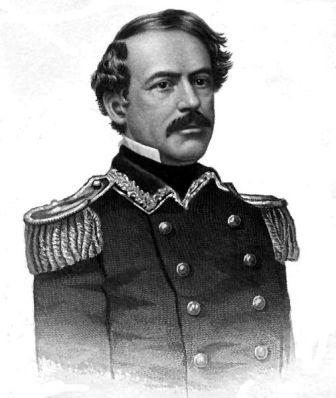
But he was much more than that. Again, from Lee: The Last Years (p. 3):
They [the soldiers] were proud of his appearance, proud of his brilliant leadership, but their hearts went out to him because he shared their risks and hardships, constantly showing them how much he admired them and appreciated their sacrifices.
This is exactly how I feel about those who have gone to Ethiopia with Becky and me. What endears them to me? Their willingness to share our risks and hardships. Their ability to put their own interests aside and sacrifice for others. Their Christlike humility. Truly, these virtues are far better than external beauty. So, to all who have ever served in Utopia with us, I say: I admire and appreciate you!
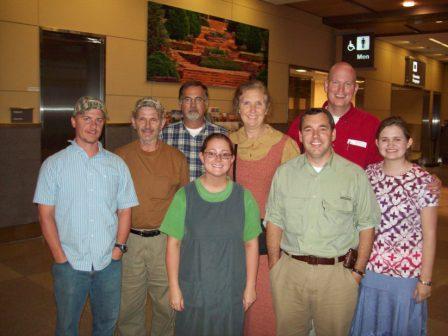
6:06 PM Conclusions #4-5 (from Paul, Apostle of Weakness):
#4. In Paul's latest epistles, the words convey little or no theological significance and are used with the common secular Greek meaning of sickness.
#5. In the Pauline letters, the terms for weakness figure prominently only in Romans and 1 and 2 Corinthians, which are usually designated to be "doctrinal" in content. However, here they are important terms not only in Paul's theology but also in his ethical teaching.
6:00 PM Just back from mucking out two trailers and feeding the cows. I'm filthy dirty, but don't tell anyone.
4:25 PM So what have I done today while the earth spun at a rate of 1,000 miles per hour? My main goal today was to rest up after 3 delightfully grueling weeks on campus. I told Nathan that whatever energy I had left over he could have, and we were able to finish the fencing in the back 40 and run a strand of barbed wire along the fence line. Becky, for her part, spent the day teaching our pastor's daughter how to sew. I thought her first dress was a smashing success. Here's a taste of what our day looked like.
A man's best friends:
Sloshing through the farm:
Cutting out the material:
Learning how to operate a sewing machine:
She's on her own!
The finished product:
12:54 PM We're unable to send emails at this time. Please be patient with us if you are expecting a reply.
8:46 AM Lord willing, we leave for Ethiopia in 8 weeks. Glory Hallelujah! Can't wait to see my Ethiopian family again, including my son Mohammed.
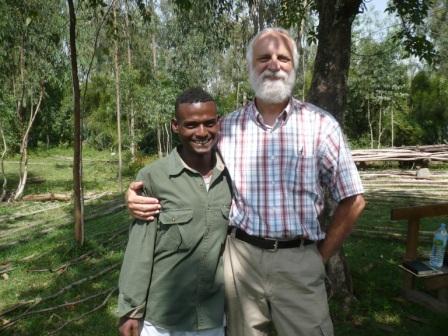
8:03 AM The amazing news about the sonographers still overwhelms me. As one emailer put it this morning:
Just as He did in the life of Jacob and family, He has now gone before you to preserve life in Ethiopia, via a sonogram and two techies! Is that not simply marvelous??????!!!!!!!!!!!!! Is He not showing His strength in your weakness of body? WOW!!!!!!
Holy Father,
In the frenzy of our modern world, keep before us our need of you. Help us to live in pursuit of your wishes, not ours. Let us be a pleasure to you and a light to the world. Use us, by your Spirit, to be a blessing to others this day.
Amen.
7:44 AM Conclusion #3 (from Paul, Apostle of Weakness):
The Pauline usage from early to late stages reveals an erratic development when analyzed in strict chronological sequence. Yet a broad developmental pattern emerges. This pattern is distinctively bell-shaped: while the terms are used infrequently in his early and later epistles, a sizable complex of the terms is discernable in his Hauptbriefe, which represent Pauline thought during the middle period of the apostle's career.
7:38 AM Read Christianity Today's Top 12 Books of 2009. I read not one of them. Must be too busy mucking manure.
7:31 AM On the one year anniversary of the president's decision to close Guantanamo comes this report from Salon: Obama to indefinitely imprison detainees without charges. What's good for the goose is good for the gander.
7:21 AM In the evenings I'm re-reading Lee: The Last Years. It's full of quotable quotes. Here's one I enjoyed (pp. 81-82):
As in the lives of all persons, Lee's essence was to be found not in what he said, but in what he did. There were other dimensions to Lee, but his life was one long response to whatever struck him as being the call of duty.
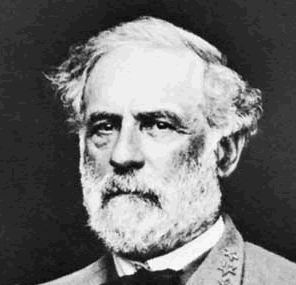
7:16 AM Conclusion #2 (from Paul, Apostle of Weakness):
Paul's theology of weakness developed in a dynamic response to the situations facing him, and his particular formulations on weakness are consistently adapted and designed to meet particular issues at hand.
7:10 AM I've just posted my first Spanish essay, thanks to the magnificent work of "Don" Tomas Hudgins and his wife Lesly. You guys are a blessing.
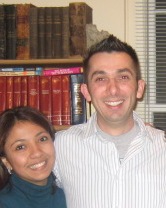
The essay is called Cristianos sin Fronteras. More coming soon....
Friday, January 22
9:59 PM Once final thought about coach McNeill while I'm thinking about it. During his interview he kept emphasizing that his new job at ECU was not a "step-up" position.

As he put it, "ECU is my dream job!" It would be wonderful if every one of us could find that "dream job." The problem is, if you found some place, some ideal church, some area that is problem free, don't go there. If you do, you're going to spoil it!
I have never taught in a "perfect" institution or been a member of a "perfect" church. Like you, I am constantly faced with stress-producing situations. At the same time, I have never been happier or more content than I am now. Both my seminary and my church are passionate about what counts most to God. I find that deeply satisfying! Both allow me to express my spiritual gifts to the fullest. Both proclaim and practice glorious, absurd cross-love. I consider neither a "step-up" position.
No matter who we are or where we are, we can trust Jesus to be with us and use us for His purposes. And even if we should find ourselves in a place that is less than optimum, Jesus promises us that we will be equipped with power from on high to engage in our tasks with joy.
Amen?
9:31 PM J-term Greek students, although I have calculated your final grades for the course I will not be able to post them to the seminary website until next week. Also, if you have any quizzes or exams that you need to pick up, you may stop by my office any time next week and my secretary will see to it that you get them. Again, my sincere thanks for your outstanding efforts this term. Now don't you dare study any Greek for at least 3 days!
8:54 PM Quote of the day #2 (Mike Bird again!):
GBM listed as his biggest intellectual influencec: C.H. Dodd, B.F. Westcott, E.C. Hoskyns, Adolf Schlatter, Strack-Billerbeck, and R. Newton Flew. He learnt several languages including German, French, Danish, and Italian by reading "Teach Yourself" books whenever he took public transport. In addition to knowing Greek and Latin, he also studied Hebrew, Aramaic, and Syriac.
Ah, George Beasley-Murray, a man after my own heart!
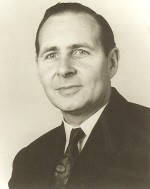
8:34 PM Becky writes:
We serve a God who not only cares for His own people and His own work but who delights to do His caring in unexpected ways that are creative and over-and-above our need. At this moment I can picture Him sitting back on His throne with a big smile on His face. He has just given us a gift of provision that is absolutely beyond words!
As you may know, we have needed an ultrasound machine at our clinic in Burji. Women regularly die from delivery complications, and an ultrasound would help our nurses to identify problems and deal with the problems in a timely fashion. An old, big machine was given to us about 6 months ago, but we could not have it serviced and transported to Ethiopia for less than $7,000. This didn't sound like good financial stewardship, so I began to search for a new, portable machine. (This was way out of my league. I'm a nurse, but not a sonographer. And there is much technical language and many abbreviations that I was struggling to understand.) Once again, God was stretching me for the sake of the Ethiopian ministry. "Help me, Lord!" became my regular prayer as I searched the Internet for a machine that would meet our need.
And help He did! He led me to a Christian nurse-turned ultrasound machine salesperson. As we talked on the phone she became so excited about the work, and before I knew it she was donating her commission! We got the last machine and the last abdominal probe, with a full 5-year warranty at a price that was thousands of dollars less than available anywhere else!

Then the issue became training. How could we train our Ethiopian nurses in the use of this machine? There are no schools for ultrasound technicians in Ethiopia; all technicians are brought to Europe or the USA for training. Option #1 was for a Christian sonographer to come with us to Ethiopia to train our staff on site. Option #2 was for me to learn sonography and then teach our staff. So we began knocking on doors for both options, all the while praying for God to show us His plan.
Tonight the door opened to a ministry that focuses exclusively on -- guess what! -- teaching obstetrical sonography to clinic nurses. Their goal is to help save fetal life! They work around the world with clinics that are focused on saving these precious little ones. They read about the Burji clinic and our philosophy of ministry, and God has spoken to their hearts about helping us. So in July they will send not one, but TWO, Christian sonographers to teach our nurses at the Burji Clinic! The goals of our teaching are simple: fetal viability (heart operation), cephalo-pelvic disproportion (is the baby too big for birthing?), gestational age, placental position, and fetal position. If our nurses can become good at these calculations, then many of the Burji women will be medically safer during their pregnancies.
Isn't our Lord wonderful? Will you stop right now to pray for the two sonographers who will come with us and for this ministry? Pray God's blessing upon them because they are giving of their skill for the advancement of His Kingdom. And don't forget to give our Lord special honor because, once again, He has proven faithful to His character. He has cared for His own! And He has done it masterfully!
Isn't Becky's report amazing? This is a real answer to the prayers of God's people for which I am VERY grateful. Thank you King Jesus!
8:06 PM An NPR reporter stated today that Haiti had gone from being "poor" to being "destitute" since experiencing the devastating earthquake that struck it last week. Excellent choice of words! And it got me to thinking. The Greek word often translated "poor" in the first beatitude ("Blessed are the poor in spirit") actually means "destitute." That's an important difference. Not being able to make ends meet is one thing. Being completely bankrupt is another. I first witnessed this kind of poverty not in Ethiopia but in India when I took a train from Cochin to Mumbai. To say that the people I saw in the countryside were destitute would have been an enormous understatement.

Don Carson has written an outstanding commentary on the Sermon on the Mount. In it he writes (referring to the first beatitude):
I suspect that there is no pride more decadent than that which finds its roots in great learning, great external piety, or a strong defense of orthodoxy. My suspicion does not call into question the value of learning, piety, or orthodoxy; rather, it exposes professing believers to the full glare of this beatitude. Pride based on genuine virtues has the greatest potential for self-deception; but our Lord will allow none of it. Poverty of spirit he insists on -- a full, honest, factual, conscious, and conscientious recognition before God of personal moral unworth. It is, as I have said, the deepest form of repentance.
Now that's eloquent! When God looks at me, does He see someone who is merely "poor" or someone who is truly "destitute in spirit"?
6:13 PM Tonight I begin publishing snippets from the "Conclusion" to my (forthcoming!) book Paul, Apostle of Weakness. There are 17 summary statements that encapsulate the results of 4 chapters of in-depth exegesis. Here's #1:
In the Gospels and Acts, as well as in the majority of NT epistles, there is no development of the theme of weakness into a broad theological motif such as we can discern in Paul. Scattered instances of a theological usage are the exceptions that prove the rule.
6:08 PM We just received some really wonderful news. Becky will share it with you later. Be prepared to shout!
5:55 PM The doggies took me on a long walk this afternoon, despite the mud, the cold, and a light drizzle.
Odd, isn't it, how dogs know what their master needs, even before he knows it?
3:46 PM Alan Knox asks, "Why do we call what pastors do on Sunday mornings 'preaching'?" He could have taken it a step further. Where I live, the Sunday meeting is called "the preaching service," and the pastor is called "the preacher man." Of course, all of these men have had courses in "preaching." Isn't it time we had pastors who were teachers?

For what it's worth, I tossed in my didrachma in an essay called Let Pastors Teach. Oh, to Lionel's comment I might respond:
Thus, while evangelism can and should be done when believers are gathered, the focus must always be on teaching the Word of God to believers. The only New Testament passage where evangelism takes place within the gathered congregation is 1 Corinthians 14, where the unbeliever is said to be "convicted by all"— not by an evangelistic sermon. Indeed, Paul sums up the exercise of the various proceedings in the assembly in one phrase: "Let all things be done for edification" (14:26).
Man, does somebody need to write a doctoral dissertation on this subject!
3:31 PM Just finished revising and updating a chapter of my 1984 book Paul, Apostle of Weakness, which is out of print and has been for years. I've never had so much fun in my entire life. Can't hardly wait to get to the rest of it. The funny thing is that I haven't changed my mind about what I wrote so many years ago. So, for all of you who have emailed me asking how to get a copy of the book, you won't have much longer to wait, Lord willing.
3:15 PM Read Matt's interview with Rod Decker. Looks like yet another New Testament prof is a farmer. Way to go Rod!
3:12 PM So they're gonna remake Hawaii Five-O. This is laughable. No way could it ever top the original show. No way could they ever replace Jack Lord and James MacArthur. No way.

3:10 PM No more Jesus rifles.
3:07 PM Lincoln Christian University announces an opening in New Testament.
3:02 PM This story – Pilot diverts flight over teen's in-flight prayer – brought an understanding chuckle. I recall once donating blood to the Red Cross in southern California. I was seated at a table about to polish off the perfunctory cookie and fruit juice they give you after they draw your blood. As was my custom, I bowed my head to pray silently before eating. Suddenly I felt two Red Cross workers gently lifting me by the arms. "It's okay," they said. "You'll feel better after resting a bit on this cot." You should have heard me trying to convince them that I didn’t feel faint but was only thanking God for my food.
3:00 PM Quote of the day (Mike Bird):
The issue I have with conservative evangelicalism is that they don't mind people more conservative than them (and even tolerate strange and obscene views like KJV-only or Landmark views of baptism), but don't tolerate anyone a smidge to the left. Tolerance should extend to the left and to the right, and I would zealously insist also that the limits of tolerance should also be observed to the left and to the right of the Church's Creeds and Confessions as well. My point is that you cannot assume that everyone the left of you is a Schleiermachian liberal. Don't put an evangelical egalitarian in the same category as Paul Tillich as that is unfair. Save the rhetoric against liberalism for the real liberals and not those a skip to the left of you on any issue.
2:58 PM Kevin Brown has his finger on the pulse of a huge problem. He asks, in effect, why so many of our pastors come from outside the community, parachuted into the church, as it were. Glad he asked. The admission of a problem is a giant step toward solving it. I'm thrilled to see that Kevin is willing to rebuild the foundation and not just rearrange a few bricks. His essay, by the way, is called "Homegrown" Pastor.
2:55 PM His name is Ruffin McNeill, and he's just been named as the new head coach of the Eastern Carolina football team. I listened to an interview with him on the drive home this afternoon. (The Lord always seems to give me something valuable to listen to as I wend my way through the back roads of Granville County on my way to the farm. Today was no exception. I give the interview two smiley faces.) Something the coach said in passing in the interview made me smile. When asked what his coaching philosophy was, he said:
Have high standards, and love the players.
Wow. Here's a man who is Carolina born and bred. Here's a man who played football at ECU for 4 years. Here's a man who said he was "coming home." And here's man whose philosophy of coaching is simply to treat his players like they are part of his family. You gotta admire that. Here's something else coach McNeill said:
My job is to take good care of the parents' most prized possessions -- their kids.
Once again the man's love for his players exudes. That's exactly the kind of teacher I want to be -- one who sets high standards and who loves my students in a way that they know it. One who takes good care of the precious commodity that has been entrusted into my care both in the classroom and outside the four walls of the lecture hall.
Coach McNeill, I appreciate your heart and passion. I love your commitment to high standards and healthy personal relationships. Of course, not everybody is going to agree with your way of doing things. But I'm glad you feel like you're back "home." And though I know absolutely nothing about ACC football (and could care less, to tell you the truth), I wish you every success in your new position. In multos annos!
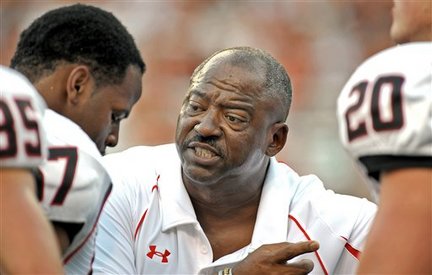
Thursday, January 21
6:56 AM It's here! My colleague Alvin Reid's first e-book, that is. Check it out here (.pdf). Yep, Alvin's still the pacesetter at SEBTS.
My favorite chapter? The last one, which is titled "Altruism -- Generosity Marks a Movement."
My favorite quote?
When the church focuses on buildings and budgets and the bodies in those buildings and giving to those budgets, we have lost the very idea which created all these. When we stay focused on the great idea—advancing the gospel with all we are—it is remarkable how such a focus strengthens families, grows the church, and influences culture.
I can just hear Alvin making that statement!
My favorite reptile on campus? Why, Alvin's of course!

Herr Professor Dr. Reid, I wish your book a long and happy e-life!
6:46 AM Only two days left of J-term. Where has the time gone? Seems like yesterday, not three weeks ago, that class started.
6:41 AM Coming soon: Spanish language versions of our essays.
6:34 AM Our first broccoli of the season:
Tasted great last night with tilapia and baked potatoes.
Wednesday, January 20
8:55 PM We just returned home after attending Wednesday night Bible study. I spoke in tongues in church for the first time in a long while. Well, German at least. No interpreter was present or needed.
Ich wüsche Dir einen schönen Geburtstag, Herrmann.
4:50 PM Just met with my personal fitness trainer:
2:55 PM In case you haven't seen it, Arthur Sido has published a mammoth series on pacifism. It is an impressive job. I dithered with the same topic in one of the chapters in my Jesus Paradigm. Arthur's words will not settle well with those who ignore all facts and merely state, again and again, what the status quo thinking is among American evangelicals. What an appalling situation we've gotten ourselves into in the Middle East! The matter finally resolves itself into a religious problem -- an uncomfortable fact that we must be prepared to face and that I am finding it easier and easier to face the older I get. All I can say is that people like Scott Horton who dare to expose the fabrications of government (see his piece in Harper's Magazine, The Guantánamo "Suicides": A Camp Delta sergeant blows the whistle) had better be more disciplined than the militarists and prepared to put up with as great hardships with a courage equal to theirs.
2:23 PM Did you do English to Greek exercises when you were taking Greek? I didn't but I wish I had. Ever since I started teaching Greek back in 1976 (for you twenty-somethings, yes, we had running water and electricity back then), I've offered English to Greek sentences as extra credit on all my quizzes and exams. And, if you get a perfect 110 on an exam (the extra ten points comes from getting all 10 Greek words correct on the extra credit), you earn the "110 Award." We had three award recipients in class today, but I'm proud of all of my students who attempt to do these translations. They ain't easy!
1:50 PM To learn a foreign language you must be willing to swallow your pride. Today in class I told my students this somewhat embarrassing story as an illustration:
On my very first day in Basel I had gone to the university library to seek out Professor Reicke. When I found him in the stacks, what language do you think we conversed in? Here I was, a fledging student from Kailua, Hawaii, meeting with a famous Swedish scholar. Naturally we spoke the language of the university – German! When Dr. Reicke mentioned that he was thinking about getting a cup of coffee, I asked him, "Darf ich Ihnen begleiten?" ("May I accompany you?") "Darf ich Sie begleiten" was his gentle corrective, and off we went to a local café. (Note: he did not switch to English.) So it was throughout my stay in Basel – me speaking German at every opportunity, and others correcting me until I reached a high level of fluency in the language, even preaching in it numerous times.
For more, read How to Master a Foreign Language. And believe me: everyone makes mistakes!
1:22 PM Almost forgot. Here's the scene that greeted me yesterday morning on campus. What an unexpected blessing.
1:15 PM If you watched Obama's War on FRONTLINE last night, you will want to read an essay published today by Ivan Eland. It's called The Next Crisis for Obama? He's referring to Iraq, of course.
1:12 PM Can meditation help students learn New Testament Greek? Craig Noll thinks so. Read his thought-provoking piece titled Biblical Meditation: A Forgotten Resource in Learning New Testament Greek (.pdf).
1:06 PM In his audio sermon entitled Prinzipien - das Fundament des Reich Gottes, Thierry Kopp argues that it is not enough to know Jesus. We must know His principles of living as well. I agree! It is impossible to think about Jesus without considering His teaching about the kingdom of God. Doctoral students, I hope you'll listen to this excellent sermon, not only to improve your German, but also to be reminded what the real purpose of all of our learning is. There is no way of denying that orthodoxy and orthopraxy are closely linked to each other, so that we can say that the one inevitably leads to the other. Or ought to!
12:56 PM Intermediate Greek students, please make a note that I've revised our course syllabus. The new-and-improved version can be accessed at the seminary's Moodle site.
12:50 PM Over at Onesimus Online, Bill Black strikes a nail precisely on the head when he writes:
In the meantime, with our Western-style churches and 'worship centers' and our Western-style revival meetings and altar calls, we’ve become really good here in Kenya at making Western Pentecostals and Evangelicals. And we confirm them in their way by putting their brightest through the paces of a Western-style theological education, one that would be recognized at a Fuller or Trinity or Gordon-Conwell or Asbury. We Westerners may be successfully pushing our Western missionary agenda (complete with charts recording the numbers of converts, numbers of churches planted, numbers of people ‘discipled’, etc), but I’m not sure we are actually and meaningfully connecting with who these people are and what their problem actually is.
It is not as easy to determine the best way to help the churches in Africa as has sometimes been imagined. In particular, I have never shared the enthusiasm for our Western-styled Bible colleges (such as ETC in Addis Ababa or NGST in Nairobi, where Bill teaches), which many suppose are absolutely indispensable. It is tenuous in the extreme to think that uprooting men from their villages and sending them to the capital city will have only salubrious effects. It is even shakier to suggest, as many Western missionaries in Ethiopia have said in recent times, that a formal education is necessary for service in the kingdom. It is much more likely, in my judgment, that a formal religious education will cause more problems than it solves. It is my conviction that sending young men to Addis for a formal education cannot avoid three problems: extraction, expense, and elitism. This is why, though I’m not unhappy with the students whom I taught at ETC, I have begun making my practice to do all of my teaching down country, that is, to return biblical education to the local church. My goal is the enable God's people to be equipped to do God's work in God's world, not to give them an excuse to sit back smugly in a wealthy capital, thinking they possess superior credentials to everyone else.
This is only the tip of the iceberg of the discussion that we could have at this point, but there are two other things I would like to stress. First, Christianity isn't about organizations and denominations and academic institutions. It's about local bodies of believers serving their communities sacrificially with cross-love. Sadly, it is all too common, once students have been exposed to the trappings of Christian higher education, to come to think of themselves as a cut above the rest of the Body. This can lead to the kind of elitism that I mentioned above. Second, sending a man off to be professionally trained and credentialed can make it appear that local church leaders are unnecessary to lead and teach their churches. They become mere observers and spectators as the seminary-trained college graduate now assumes the leadership and teaching role. I am constantly amazed at how many local church elders I've met both in Africa and in the United States who are eager to abdicate their own responsibilities once their graduate returns home. We ought to know better than this by now. Living as church means soaking ourselves in our local communities, hearing God's voice in Scripture, and obeying His love commands. All this means is that the church in Ethiopia, like all churches everywhere, will develop their own distinctive shape. Jesus Himself taught His disciples in an informal setting. He modeled for them what incarnational love looked like. They ate together, lived together, and ministered together. Despite what many Africans (and Americans!) think, Christianity isn't about higher education or diplomas in theology. It is about Jesus followers who deny themselves and take up their crosses. The only way to find yourself, said Jesus, is to lose yourself. When we start to glimpse that, the lure of the world will grow less and less important. As I have written elsewhere:
We in the church of Jesus Christ are always in danger of magnifying titles and degrees and forgetting that a formal theological education guarantees neither sound doctrine nor mature character. The essential mark of Christian leadership is love not ability, humility not arrogance, wisdom not knowledge. We must cease viewing knowledge as an end in itself, but must pursue the mind of Christ, remembering that "truth is in Jesus" (Eph. 4:21). I wonder if anything is more urgent today, for the building up of the Body of Christ, than that its leaders should be, and should be seen to be, men who have "been with Jesus" (Acts 4:13).
The crucial thing is that local churches take discipleship seriously. And it is neither biblical nor helpful to abdicate this responsibility to institutions of higher education, as valuable as they are. The seminary exists to serve the local church, not vice versa. So when opportunity occurs to return biblical education to your local church, I say grasp it with both of your hands!
12:41 PM Quote of the day (Lionel Woods):
Elders (Pastors) are to go before the church in developing the family atmosphere, cultivating love, stimulating mutual edification and finally producing an atmosphere of openness, in order that people begin to love one another from the heart and be conformed to Christ's image! These are roles of elders, but too often they are stuck in "business meetings" or meeting with architects, or they are the body’s local business man and his biblical roles and functions become a distant second in his overall responsibilities.
12:34 PM Becky – thank God! – has been feeling well enough to continue her radiation treatments. We cannot expect miracles where the ordinary will suffice. Yes, I am expectantly asking God to heal Becky completely from her cancer. God can do that exceeding abundant thing beyond all we can ask or imagine. Yet we must be faithful to do our part. I recall the passage where Jesus, preparing to perform a great miracle, tells the people, "Fill the water pots with water" (John 2:7).

What a strange request that must have seemed! Wine was needed, not water! But Jesus had a plan, and when God speaks we should prepare for the miracle and arrange for the impossible. Forgive me if this sounds simplistic, but here's my attitude about Becky's illness: When the wine has given out and the Lord tells us to fill the water pots, we have to obey. If He is planning on using oncologists to heal my wife, then we had better do as the doctors instruct us.
Does that make any sense?
12:27 PM The city of Basel has always been famous for its Fasnacht and its "secret" drum corps that perform during the Morgenstreich. The event is usually televised throughout Europe. Bec and I once saw it live and in person. Well, here is the finest drum corps not only in Basel but in the world. Watch and be blown away!
12:25 PM This email blessed my heart:
By the way, please tell Mrs. Black that her latest essay "Spiritual Fatigue" was an especially sweet blessing to read this evening. "...we can do nothing. Nothing. Absolutely nothing. Except revel in His love and trust His sufficiency." What a sweet, sweet encouragement and convicting reminder this evening. Thank her for me.
Glad to do it.
12:20 PM Kudos to Rodney Decker for producing a spectacular list of problematic Greek verb forms that occur in the New Testament. This list will inflame your heart and guide you to read the Bible for all it's worth. Just kidding. But it is very useful if you are struggling to correctly identify irregular verbs. Thanks, Rod, for a helpful resource.
12:15 PM Greek and Latin students! Check out the free Loeb series here. (Note: The quality of the page scanning varies considerably.)
12:12 PM Watch Joni testify about God's faithfulness in the midst of her disability. "Who is this God that allows us to suffer?" she asks. "I figured that God had been caught off guard when my diving accident had happened." This You Tube, by the way, was shot at my alma mater, Biola University.
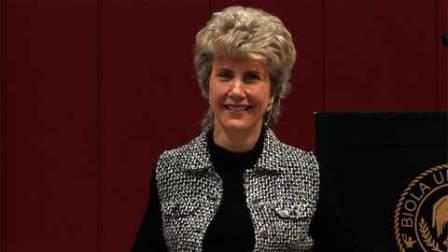
The thing that I love about Joni's testimony is that it is profoundly simple. Trials test God's workmanship. The average Christian today is flabby for the lack of such exercise. It takes hard work to overcome our dull spiritual sensitivity when we are tested. It takes prayer and love and patience and obedience. I see all of those beautiful qualities in Joni. Blessed be God who gives "songs in the night." And praise be to God for giving us such a precious saint like Joni. Her words are like a warm blanket covering me on a cold night.
12:07 PM According to Bill Quigley of Counterpunch Magazine, there are Nine Things the U.S. Could and Should Do for Haiti. I say Amen to all of them.
12:02 PM Former German Chancellor Helmut Schmidt is interviewed by theologian Hans Küng in an outstanding You Tube series (here's part one). What does Schmidt believe is the role of the church in the modern world? What does he think about Germany's nine neighbors? What does he believe is the place of theology in German society today? What is his position vis-à-vis the war in Afghanistan? Listening to this series was for me like rummaging through an old attic and discovering an ancient Greek manuscript. Eine sehr schönes Bekenntnis. Obwohl ich seinen Glauben nicht ganz teilen kann, höre ich einen so großen Staatsmann wie Helmut Schmidt sehr gern zu. For anyone interested in the place of Christianity in the modern world, this interview contains interesting signposts beyond the landscape of our contemporary culture. Highly recommended!
Incidentally, the one face people can't seem to get in my little "Can You Name the Face?" contest belongs to Helmut Schmidt. Here's my drawing:
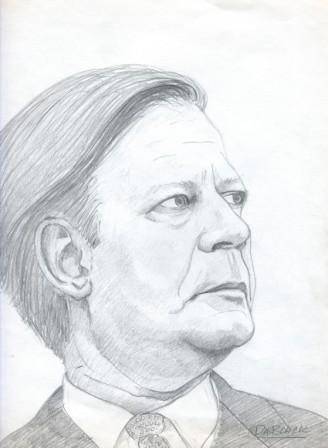
And here's the original:

11:45 AM Lawrence Vance reviews James Hewett's New Testament Greek: A Beginning and Intermediate Grammar.
Monday, January 18
5:58 AM In the February issue of The American Conservative, Joseph Margulies reviews John Yoo's Crisis and Command: A History of Executive Power from George Washington to George W. Bush.
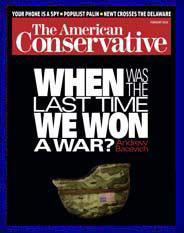
I share Mr. Margulies' cynicism. It continues to amaze me that "conservative" evangelical Christians can support torture as well as warrantless domestic surveillance while claiming to uphold the U.S. Constitution. The reviewer puts it well:
The presidential impulse to take liberties with the Constitution is thus not a sign that some presidents are great but that all are human. For that reason, it bears no relationship to excellence. In arguing otherwise, Professor Yoo makes an elementary logical error: because great presidents have bent the Constitution, he thinks greatness must require it.
5:45 AM Watching the video The Longest Day last night I was reminded of just how ridiculous it is to think that one can translate from one language into another literally. All languages contain idioms that are impossible to render word for word. When a German general says, "Das liegt zu sehr auf der Hand," he wasn't saying "That lays too much on the hand." He meant, of course, "That's too obvious."

Thankfully, the person who wrote the subtitles to the movie did an excellent job with these idiomatic expressions. In Intermediate Greek this semester we'll be working diligently on increasing our capacity to think in idiomatic Greek through composition exercises. Should be fun.
5:37 AM It will be a very busy week for my Greek students. Here's our schedule:
-
Monday, quiz over chapter 10.
-
Tuesday, quiz over chapter 11, take home exam over chapters 7-11.
-
Wednesday, introduction to chapter 12.
-
Thursday, quiz over chapter 12.
-
Friday, quiz over chapter 12, exam over chapters 12-13.
-
Saturday, crash and burn.

5:31 AM If you're a fan of the famous preacher John Wesley, here's a tour just for you. The itinerary reads (in part):
Thurs., May 20 — London
Tim Macquiban will lead us on a historic tour of Wesley’s Chapel & Home at City Road, Bunhill Field, the Aldersgate Street monument, Charterhouse School, Westminster School, & Methodist Central Hall, concluding with evensong at St. Paul’s Cathedral. Return to St. Katharine’s for group dinner and closing worship.
Wonderful! Speaking of London, I am a huge fan of city gates. Here is the famous Aldersgate, an early Roman gate.

In Basel, my erstwhile home, stands the famous Spalentor, constructed in the 1400s. A block away stood the three-story home of my Doktorvater and his wife.

Finally, Becky and I lived a block from the Rhine and within earshot of the Sankt Johanns Tor. I can still hear its clock chiming out the hours. What memories!

5:25 AM Today Becky has the day off from her treatments. She has been doing well but is extremely tired. Thank you for all of your prayers. God is good!
5:22 AM A student of mine sent along this link: Missions After Haiti. I highly commend it. I have been telling students for years that they don't have to wait to be sent out by a mission board to serve Christ abroad. And now here's more proof that this idea is finally finally catching on. Don't miss this paragraph:
I recently heard of a couple at seminary at Dallas Theological. They plan on being missionaries in rural France. But they’re model is different. They won’t be funded by a denomination. They will go into a town and teach and coach sports, all the while doing ministry, and plan on planting a church. They will work in France, and try to make money to fly back to the US every now and then to visit family. But they will become essentially French.
I am convinced that the time has come for us to move beyond the professionalization of the missionary enterprise. Don't think for a moment that that's the only way to do missions!
5:14 AM Ethiopia Update:
1) This picture of Brad Lapsley, my father-in-law (left), appeared on the cover of the Sudan Interior Mission's AFRICA NOW magazine in 1964. Dad and a fellow missionary had just arrived in southern Ethiopia, where Becky and I have the privilege of serving King Jesus today.
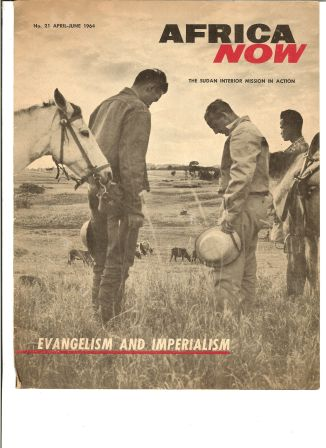
In dad's life, absolute, personal loyalty to God and His kingdom had taken precedence over anything and anyone else. And the missionary's first and main business is to commit the work to the Lord, just as dad is doing here. I cannot tell you how touched I am by this photo. Dad was part of a post-WW II generation that meant it when they said, "As for my and my house, we will serve the Lord." What's more, they were able to translate that desire into the day-by-day, nitty-gritty dealings of life. I am reminded of an entry in the diary of David Brainerd, missionary to the American Indians:
I found in myself a spirit of love, and warmth, and power, to address the poor Indians. God helped me to plead with them to "turn from all the vanities of the heathen to the living God...." And when I came away from them, I spent the whole time, while I was riding to my lodgings three miles distant, in prayer and praise to God. After I rode more than two miles, it came into my mind to dedicate myself to God again, which I did with great solemnity and unspeakable satisfaction.
"Unspeakable satisfaction." What an apt description of the one who walks in obedience to the Father. Oh, may it become a way of life for me to enjoy such fellowship with God as I serve Him!
Dad, by the way, hasn't stopped serving the Ethiopians. Currently he publishes books in Amharic that assist the church in Ethiopia to grow in grace and in the knowledge of the Lord Jesus. His website is called Good Amharic Books. If you know any Ethiopians, you might want to share this site with them.
2) On the back of the same magazine appears this ad. Almost every line leaps off the page to me. The ad really says it all, doesn't it!
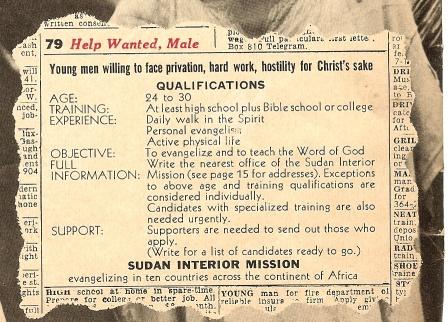
Out of our commitment to God must flow our commitment to the world. Every one of us ought to strategize how to get people to Christ. And every effort is worth it. God loves people! And He needs us to be His hands and feet to them. I love the brutal honesty of this ad: "privation, hard work, hostility." Amen! That's exactly what you will face should you become serious about becoming a World Christian. Is there built into your heart and into your lifestyle a genuine desire to reach the world for Christ? Let our chief concerns be in harmony with God's concerns. Let our burdens be His burdens!
3) Finally, you may recall me telling you that two Burji men were wounded recently by the Gujis. Thanks to our clinic vehicle both men were able to receive medical treatment that saved their lives. This letter was sent to the church leaders from their family. I have edited it slightly for spelling.
From Gara church and Yohannes and Wolid family and relatives
To Burji KHC Soyama
Thank you for helping us on this very painful moment in Arba Minch hospital. This is the most blessing & unforgettable help in our family life. We will not forget this special support. Also we would like sincerely thank American flock who provided the Ambulance to Burji KHC Galana Clinic.
In Burji we are neglected people. To die or to live makes no difference. In this gory condition many lost their life, properties and jobs. We do not know what the Burjis future will be, every time losing precious people in this community with Guji conflict. So far no humanitarian originations participated in giving any support in order to alleviate the pain of current situation of Burji community. Please pass our message to our brothers and sisters in America. You, our brothers and sisters from American, are the only people who arrived on time for our Burji community need.
Two month ago we the family received sad news that Yohannes and Wolid were shot and injured by Guji invaders. By God’s grace these two people were not died. The road from Agremariam to Burji is unthinkable. First we rushed both victims to Galana clinic. Galana clinic staff gave at most capacity treatment, and immediately they wrote referral to Arba Minch hospital. With the family and relatives help we took Yohannes and Wolid to Arba Minch hospital.
The recent conflict with Guji created in our family a huge financial dilemma. When the doctor told us to take the victims home we get in a big dilemma. First we asked for transportation Burji special woreda government a vehicle; they are not willing to help us. We cried out to our God until we had no more power to weep. God really answered our prayer by our American Christians using our sister Becky at the right time and needy moment for our family and community. These two wounded men cannot sit; this makes us concerned a lot. In public transport vehicle nobody allows us Yohannes and Wolid to lie down and come home.
But on your vehicle they lie down comfortably to home. We entire family do not have any words to express our feeling and our happiness for what you have done for our family. Thank you so much for the use of the vehicle. On this hard moment you carried our burden. Let God reward you. We are not able to pay you back.
God bless you,
Gara church, and Yohannes and Wolid family and relatives
Here is the Body of Christ in Burji, Ethiopia, reaching out in all directions! Not as individuals but together -- in teams, in cooperation, through prayer and often through tears. Generous Americans like you paid for the vehicle. How awesome! And God gets all the glory.

Sunday, January 17
2:40 PM Today at The Hill, Woody asked me how I was feeling. "Every muscle aches, but I've never felt better," I replied. Putting up fencing can give you a great workout, believe you me. Nevertheless, even though I was hurtin', can you believe it that about a half hour ago Nathan asked me if I would help him load some hay for a delivery down to Oxford? You say, "He wouldn't do a thing like that to his dear old dad, would he?" Yep, he would. And his dear old dad was happy -- eager in fact -- to help.
That's farm life. And I love every minute of it.
2:34 PM Brother Jason's message today from Acts 4-5 was a wonderful reminder to me that the church needs to be generous at all times, not just when disaster strikes. What an encouragement -- and warning! -- this passage must have been to the early church, and what a strong exhortation it could bring to many in our own day. Our American churchianity often puts our needs and comforts above those of others. Our culture is smug and self-centered. Jesus insisted that His followers care for the vulnerable. That, after all, is how He lived.
As Jason was speaking, my mind wandered (sorry, Jason!) to another passage that speaks about generosity, namely James 1:17. In church I happened to have the NET Bible with me (along with my Latin and Greek, of course), and I was delighted to see how Dan Wallace & Co. had rendered this verse: "All generous giving and every perfect gift is from above...." Fantastic! This verse contains a great but often overlooked truth: Not only do our gifts ultimately come from God Himself, but even our desire to give -- our propensity to be generous, if you will -- is the product of God's grace at work in our lives. This truth is masked, of course, in the NIV's rendering, "Every good and perfect gift is from above...." What a horrible conflation of the two different Greek words here for "gift." (The NIV, to be acceptable here, simply needed to add a note giving the literal. Sadly, it often fails to do that.)
All of which means that I can take no credit either for what I give or for the desire to give it!
8:45 AM Imagine building a new house and stumbling upon the remains of some Christian martyrs.
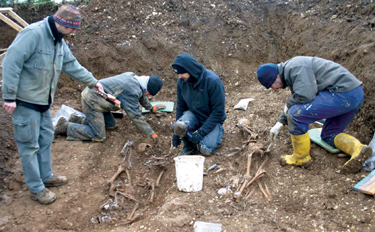
This happened to a couple in Germany recently. You can read the story here.
On Dec. 4, 1529, seven Anabaptists were sentenced to death by sword “due to the error of rebaptism,” and the executions were carried out three days later Dec. 7. They were the uncompromising core of an original 40 Wiedertäufer “rebaptizers” — half of whom were women — who were arrested for both “hidden preaching” and the more serious offense of unauthorized assembly.
Amazingly, the Anabaptists of Europe went to their deaths praying for their persecutors. What a contrast with a tweet I read this morning on a pastor's website:
Our conceal & carry instructor: better to be judged by 12 than carried by 6!
8:30 AM Quote of the day:
As spiritual and as lofty as the vision language sounds it is nothing but mere spiritual jargon. NOWHERE and I do mean NOWHERE are leaders to have any sort of special vision for a local church. Actually what was prophesied in Joel had come to fruition in Acts 2 as the entire upper room was filled with the Spirit and everyone spoke in tongues and others had visions. I am very subscious [suspicious] of the vision language as it is usually propagated to rob the priest of their participation in the decision making process. If a leader comes along and says “I have a vision” there is very little non-leaders can say to question it, as leaders, especially the one man pastor tradition, have been hired for the sole purpose of “casting vision”.
Read Prosthetic Leadership.
8:05 AM Forgive me for bringing this up again, but I have been impressed in reading Colossians this morning by the absolute necessity of acknowledging the lordship of Jesus Christ not only in our personal lives but also in the congregational lives of our churches. "Blessed are the poor in spirit," said He, but how many of us really believe that this applies to our churches? There is a sign I would like to see in front of a church building sometime. (I've pointed this out before.) It would read as follows:
Senior Pastor: Jesus Christ
Ministers: Every Member
I wish I could say that I knew of a church, somewhere in this world, that had really grasped this strange view of pastoral authority and was struggling to live by it. If the Lord Jesus Himself could suffer in all humility "outside the camp" on our behalf, I should think that we His followers would be willing to do no less. We have to learn today how to translate Jesus' teaching to His disciples so that it becomes our truth too. This is the vision that Paul embraced when he wrote Col. 1:18:
And he is the head of the body, the church; he is the beginning and the firstborn from among the dead, so that in everything he might have the supremacy.
This is truly a revolutionary concept! The Gospel overturns the normal power structures of society but also challenges the sort of power structures we erect in our churches. No wonder we hang on so desperately to our symbols of status and prominence -- Jesus the Head is a blow to the solar plexus of our church life. But a correct understanding of Jesus' preeminence leaves us no option but to see to it that "in all things He has the first place."
Jesus is calling us -- whether pastors or so-called laypersons -- to be the church in a radically new way. He blesses neither our manmade kingdoms nor our brilliant strategies. The Sermon on the Mount puts an end to all that.
So how are we going to line up with the issue of the lordship of Christ and think Christianly about it? Could it not begin with something as simple as announcing to all that Jesus Christ is the Head of our local church? That would take a miracle -- I hear someone say. Well -- isn't God able to work miracles today? If we have signed on with Jesus for the sake of the kingdom of God, we can do no less. We, the people of God, are called now to wrestle with the strange priorities of God.
7:42 AM As I sit here enjoying the dawn of a new day and listening to the rain, I'm sipping the most delicious French Vanilla coffee, a gift from our daughter Liz. Thank you, Liz, for your thoughtfulness. Makes me feel all warm inside.
7:37 AM Good morning, bloggers and bloggerettes! As everyone knows, my life of late has been pretty crazy. It hasn't stopped me from blogging, of course, and that is because my blog isn't really a blog at all. What I do here is reflect out loud on my life and -- especially right now -- my impressions about the amazing journey my wife and I are on. Needless to say it's been an exciting if also a bit of a stressful time. I've been rediscovering that the truth of the cross is present at all times and in all places, whether it's an oncology center at UNC or a campus in the Forest of Wake or a farm in rural Virginia. The cross reveals the true loving heart of God, and when I stand at the foot of the cross He is always present, mysteriously at work in the here and now in anticipation of the day when I will join Him in His new world.
Until that day, what is my calling as a Christian? I am called to hold on to the cross with one hand and, with the other, to hold on to people in love, courage, humor, selflessness, and sympathy. It's no good for me to deny the one or the other. I must allow myself to be drawn to God and at the very same time to obey His call to love and serve others. My task is simply to be faithful to the cross of Christ as an agent of His love toward my wife, my family, my friends, my students, and my world. It's not a matter of doing something for God; it's a matter of God acting in and through me.
Will I live up to this calling? Will you? In my opinion, this is the most challenging objection to the Christian faith. The problem is when people look at us and say, "If that's Christianity, I want none of it." We've got to be honest with ourselves, even if it hurts. It's one thing to point the finger at the Pat Robertsons of this world. It's quite another to ask ourselves "Am I adamantly sacrificing for the poor and suffering?" "Am I radically manifesting the beautiful kingdom of God?" It's a problem I wrestle with each and every day. And it's something I'll continue to write about on my "blog."
Whether you are a blogger or not, I invite you to join me in the journey on the long road home.

Saturday, January 16
9:35 PM A brief word to my J-term students: "Don't get tired of doing what is right" (2 Thess. 3:13). Two weeks down, only one week to go. Don't get tired of doing what is right. Remember the goal: The ability to read your Greek New Testament with the minimal use of a lexicon. That is my solemn promise to you. So...
Don't get tired!
9:23 PM The rain is on its way. There's nothing quite like listening to rain falling on a tin roof.
7:28 PM Becky, whose appetite has not been all that great lately, told me tonight she felt in the mood for -- Ethiopian food! Especially injera. Hmm, methinks we'll need to get down to Raleigh this week and buy some.

7:15 PM Guess who was eating apple plum baby food today. My little grandbaby! Nolan, you rascal, you are growing up WAY too fast!
7:06 PM Today we welcomed Matt Meadows and his wife Jennifer and their son Isaac to the farm. Matt, a seminary student, had been wanting to visit the farm for the longest time in order to put his considerable manual skills to work. Today was that day. I was amazed at how much quicker our work went with Matt along. Indeed, such a good job did he in mucking out the manure that we have given him a new official nickname:
The Skubalator!
Pix (of course):
6:46 PM I remain deeply moved emotionally by the tragedy in Haiti. I'm not exactly sure why. Maybe it's because Becky and I spend several months each year in Ethiopia among the poorest villagers in one of the world's poorest nations. Many evangelical pundits have published excellent responses to Pat Robertson's statement about Haiti. But I urge you not to limit your reading to Christians only. Over at Newsweek, Lisa Miller (pictured) has published a heart-wrenching essay entitled Why God Hates Haiti. It is Newsweek at its very best. Two reflections of my own emerge from her editorial.
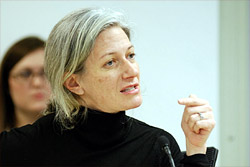
First, it is impossible to overestimate the impact that Pat Robertson's statement has had on the American public. Yet as utterly trivial and superficial as it was, I suspect that there are many other evangelical Christians who think the same way. This helps me to understand why people like UNC Professor Bart Ehrman (who is quoted in Miller's piece) should find in evangelical Christianity a stumbling block to faith in God.
Second, and perhaps more importantly, the tragedy in Haiti is at its deepest level a reminder that the problem of evil cannot be reduced to a proposition to which one can give unqualified mental assent. The New Testament offers neither a philosophical explanation of evil nor a set of answers to all of our questions about how we might cope with natural disasters. The Gospels reveal how God works through suffering to accomplish His purposes. They hold out the promise that one day the long night of sorrow will be over and the new day will dawn. But we are not told in a way that satisfies our puzzled minds why God allows evil to exist within His beautiful creation.
I suspect that Professor Ehrman got it right when he said, referring to Pat Robertson, "If that happened to the Haitians because they're so sinful, then why hasn't it happened to him?" And, I suspect, the more we learn the meaning of forgiveness in our own lives, the more we shall be able to handle the chaos all around us, and the more we shall be able to sympathize with those whom it has struck the hardest.
8:18 AM We're expecting rain tonight but today should be clear and warm, with a high of 60 degrees -- perfect weather for putting up fencing. Can't wait to get started.
8:08 AM (Inane) quote of the day:
"When people are playing football and hearing the vuvuzela, they are getting the power of our Holy Spirit," he says.
Read Unholy row over World Cup trumpet.
7:56 AM That Andy Stanley is quite a writer. I'm enjoying his book immensely. On p. 3 (note 10) he observes how many scholars feel that James is at odds with Paul. Then he quips:
Yet I have not as yet read any commentary on Romans 3-4 that even comes close to suggesting that Paul has contradicted James (and given the possibility that James wrote before Paul such a comment is not out of the question).
Isn't that great? Of course, the supposed contradiction between Paul and James is a straw man. For Paul there is no faith without works. We need read only Rom. 1:5; 13:8-10; Gal. 5:6; and Eph. 2:8-10 to see this. Udo Schnelle in his Theology of the New Testament (p. 627) puts it this way: "The Letter of James emphasizes the nature and indissoluble unity of faith and action; it advocates an integrative concept of faith, in which it is presupposed that faith includes hearing and doing the word." Or, as James Dunn says in The New Perspective on Paul (p. 96), "Justification by faith alone needs to be reasserted as strongly as ever it was by Paul or by Augustine or by Luther.... But its full scope needs to be appreciated."
Augustine (pictured) was correct when he said that works do not save anyone but at the same time no one can be saved without them.

As you can see, I'm having a wonderful time with my "weekend reading"!
7:45 AM On our home page, Becky continues her series on suffering with an essay titled Spiritual Fatigue.
Friday, January 15
8:40 PM Okay, so I couldn't resist.
8:23 PM Oh, that organ concert at Duke I was planning on attending with Nathan next month? Well, I got the date wrong. It was held in February of 2009, not 2010. Somebody hit me with the stupid stick.
8:18 PM A question. Do college athletes chose their school because of the coach's fame or the institution's reputation? This question is being discussed on sports radio talk shows in my area in view of the game of musical chairs that several coaches in the ACC are playing these days.
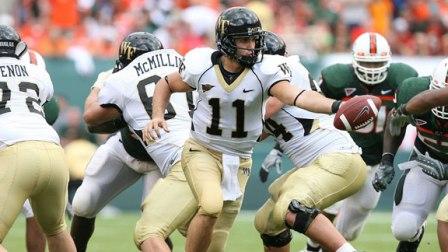
For what it's worth, I'll toss in my two cents. My guess is that most college athletes pick a coach over an institution. I think I would. I did, in fact, that very thing when I was selecting my doctoral program. Having looked at many European universities, I had narrowed the field down to two: Tübingen and Basel. I had the choice of either. I chose Basel for one main reason, and his name was Bo Ivar Reicke. Yes, I chose the man, a man who to me modeled what a New Testament scholar should be. I think this is the common experience of many young scholars at a stage in their academic pilgrimage. For once you have have chosen a doctoral program (and have been admitted to it), you embark on an irreversible course. I tell my M.Div. students, "You will always be known by your terminal degree, so chose carefully." My hope and prayer, then, for all who elect to go on this pilgrimage, is that you will chose well and chose carefully, and that you will remember the importance of mentoring at the doctoral level.
7:55 PM In 2008 I published a book called Perspectives on the Ending of Mark. This book grew out of a set of addresses in Wake Forest during the spring of 2007. It was designed with two things in mind. First, it sought to give readers an overview of the main approaches to Mark 16:9-20. Hearing the various speakers at the conference was a wonderful experience for me, and I am glad that we now have their essays in book form. Second, it was designed as a reminder of the importance of the art and science of New Testament textual criticism in exegesis. I had in mind, when inviting the participants, to reawaken interest in this often-overlooked aspect of biblical studies. Again, I trust that this larger purpose has been helped by making these essays available to a wider public.
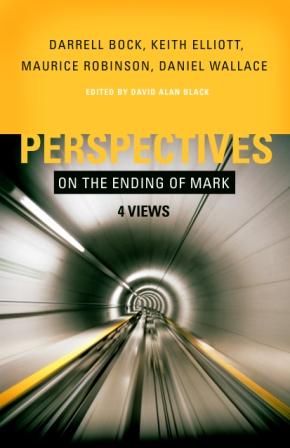
This book has now been reviewed by Steven Cox of Mid-America Baptist Theological Seminary in the latest issue of JETS (Dec. 2009, pp. 859-61). My sincere thanks to Steve for an excellent and balanced review of the book. It is interesting to me that Steve's views on the ending of Mark have changed since he wrote his dissertation. I can say much the same thing for myself. Perhaps this is a salient reminder that we must always be growing in our understanding of the Scriptures and always willing to change our views if and when the evidence requires it.
7:42 PM What a pleasant surprise! Nate, Jess, and Nolie dropped in for supper. Becky and I like surprises like that. I took lots of pix (of course) but I'll only bore you with one tonight. It shows Nolan admiring a picture of his great-great-great grandfather James Wade Lapsley (Becky's great-grandfather). Isn't that sweet?
5:44 PM The cattle have all been fed their supper. Scrumptious locally grown hay. Becky's in the cocina preparing ours. (Supper that is, not hay.)
2:58 PM So glad to be back on the farm. Even though I've got tons of work to do, I'm relaxed and cheerful. When I was a boy there was a craze about going to the beach for fun and relaxation. I suppose the farm has replaced the beach for me. There's nothing like a long walk on the old farm paths to put body and soul back together again. I see the pond is finally melting. That's very good news and means safety for our animals.
It's so warm today that the cows prefer the shade to the open sunlight, what with their winter coats and all.
Finally, here's my home sweet home. If you've ever been to the Holy Land you've probably traveled from Jericho, which is the lowest spot on earth, to Jerusalem, which is 3,000 feet above sea level. When you reach the Mount of Olives you suddenly have a glorious sight of the holy city. There's a great sense of delight and relief when you finally leave the hot desert behind and reach the top of the mountain. That's exactly how I feel whenever I see Bradford Hall, our humble adobe.
How gracious and kind is the Lord!
1:51 PM Louisiana College announces the following opening:
Christian Studies. Assistant professor, doctorally qualified, to teach OT and Hebrew, NT and Greek, as well as theology and Christian worldview classes. Successful candidate must affirm the Baptist Faith and Message and the Chicago Statement on Biblical Inerrancy.
Not sure what "doctorally qualified" means, but it sounds to me like the candidate is expected to teach a whole lot more than I would want to.
1:40 PM This BBC report is good news in the fight against the dreaded disease of malaria, especially as more and more people become resistant to current drugs. In 2006 alone, between 189 and 327 million cases of malaria were reported worldwide, with over 880,000 deaths, largely children in Sub-Saharan Africa. According to this UNICEF report, an estimated 9 million malaria cases are reported annually in Ethiopia. Of these, only 4-5 million people will be treated in a health facility. The remainder often have no medical support. I know from personal experience that malaria can be a tough illness – I mean really tough! Thankfully I had good medical care and effective medications here at UNC. My heart goes out to all those in Ethiopia who suffer year in and year out from this deadly disease.

1:34 PM I really appreciate the sentiment behind Eric Carpenter's post about Haiti's earthquake: Haiti, Compassion, and Humility. We Christians do not need to go to Haiti to impose on them our own solutions to their problems. I dare say the world has seen enough of our "Christian" crusades. We go to show the love of Jesus and because He Himself is the "way" – the way to make sense out of our daily struggles. We go to show our fellow sufferers (for all true Christians suffer) what it means to cling to the cross, not knowing the solutions to all of our problems but only that God is always beside us – indeed, grieving with us in our pain. I suppose not only Haiti but many other nations – Iraq, Afghanistan, Sudan – could benefit from the spirit of Christian humility that Eric speaks of. It certainly seems preferable to the kind of muddled thinking emanating from CBN, wouldn't you say?

1:28 PM Quote of the day (David Hayward):
One of the things I had to realize is that blogging every day prevents you from writing perfected and completed thoughts. But I see this as completely valid: you are allowing people to observe you process your theology and praxis and person. Books are concrete. Blogs are concrete before it hardens. So your ideas and writing will be imperfect and sometimes outright wrong. Get used to it.
I'm fine with that. Of course, I at least try to make my posts coherent!
1:23 PM Greek students, some time ago I mentioned that Michael Halcomb had started a series called Getting Greek. If you haven't done so yet, please check out his site. It's super easy and super informative. To be perfectly honest, sometime you can get TOO MUCH help in studying Greek. But if you need a bit more assistance than your textbook offers, this is a great place to go.
1:20 PM Sorry to interrupt all the usual blather here at DBO, but here's a special announcement for you Pauline students out there. After watching my Paul, Apostle of Weakness go out of print several years ago, I've resolved that I would turn my attention this year to revising it (or at least parts of of it) for re-publication. I don't pretend for a moment that I will be able to provide a complete survey of the literature on the subject since 1984, but I feel that the book's central thesis still stands and that it needs to be taken out of moth balls. I suspect that the more I return to this subject, the more I will glimpse the deep theological truth that God's strength is perfected in our weakness, and the more I will be enabled to draw upon His grace to face the monsters from the abyss. So, I beg your patience for a few months as I revise the manuscript. In the meantime, don't be surprised if the theme "When God does His most perfect work" becomes a more permanent feature on this site.
Incidentally, I note with some amazement that in Udo Schnelle's massive 910-page Theology of the New Testament (ET 2009) nary a word is said about astheneia or weakness. At least neither word is listed in the indexes of Greek words and English topics.
1:12 PM I don't want to come off as credulous, but I have always been a bit skeptical of Mr. Obama's commitment to change. Nat Henthof agrees. Just read his latest op-ed piece called George W. Obama. The money quote in this fine essay is the following:
It's become an Obama trademark: reversing a vigorous position he had previously taken….
The best part of this essay, though, is its final sentence. Read it and see for yourself.

1:08 PM Indiana Wesleyan University announces an opening in New Testament.
12:55 PM In writing my book Godworld I am struggling with the perennially important question of how different visions of Jesus relate to different visions of culture. Since my graduation from Basel I had focused almost exclusively on Paul, coming to the question of Jesus and the Gospels in the late 1990s. The plan of my book Why Four Gospels? took shape while dialoging with the monks at an abbey in West London where I had gone to translate for myself the patristic testimony from the Greek and Latin concerning the historical origins of the Gospels. It's impossible to overstate the importance of "ad fontes" in my life and work. Because of my fresh reading of the church fathers I deliberately set out to work on a new approach to the synoptic problem, one that I hoped would thereby advance an ecumenical dialogue that is often overlooked. Today I am drawn to the teachings of Jesus contained in these writings, partly due to various crises, exegetical and personal, and partly because I believe that the historical evidence about Jesus drives us to heal the breach between "knowing" and "obeying" Him. If we are to talk meaningfully about Jesus today, there is no question that we must begin with His shameful death and glorious resurrection. In reading the Gospels "again for the first time" (to parrot Marcus Borg), I discover a Jesus who is not simply the supreme motif for human behavior but the Messiah-King through whom God will accomplish His purposes on earth. In Godworld I aim to show how much the cross of Jesus is central to the Christian faith and how it must form the focal point not only of our theology but, even more importantly, the focus of our practice and daily behavior as Jesus-followers.
If you're a person committed to seeking first the kingdom of God, please take the cross-love of Jesus seriously. We have to remember that God is most pleased with us when we not only trust Him but also obey Him by walking the same sacrificial (and often lonely) path that Jesus walked.
12:45 PM I'm looking forward to translating portions of Hebrews with my fourth semester Greek students starting in a couple of weeks. We won't have much time to discuss authorship issues, other than to dispel the notion that Origen held to an agnostic view of authorship. I will ask my students to actually read Origen himself (what a novel idea!) in places where he quotes Hebrews. Some of this information I've already assembled for them in this essay: Origen on the Authorship of Hebrews. My goal is not to convince anyone one way or the other about the Paulinity of Hebrews but simply to illustrate the importance of exegeting a text – be it a New Testament passage or one in the fathers – in its own context.
12:40 PM What do horses have to do with peace-making between Arabs and black African groups in Darfur? This photo essay from the BBC has the answer. And yes, this is a superb photo. There is nothing in the world quite like being on horseback during a full gallop, as shown here. The excitement in this picture is almost palpable to me.

12:34 PM Hey, bloggin' buds. Look at what I'm reading this weekend:
-
Schnelle's Theology of the New Testament.
-
Stanley’s Did Jesus Teach Salvation by Works?
-
Porter and Boda's Translating the New Testament.
-
Dunn's The New Perspective on Paul (revised edition).
-
Keener's The Historical Jesus of the Gospels (which he discusses in this fine interview at brother Matt's site).
-
Bauckham et al., The Epistle to the Hebrews and Christian Theology.
Let me explain. I didn't buy any of these tomes. I borrowed them from our library. I am absolutely not saying that you shouldn't buy books. But I usually let others do the buying for me. Then, if I really like the book, I will buy it for myself.
12:29 PM Today I listened to the audio of Philippians in Latin. Check it out here if you're interested in listening in.
12:22 PM Seminary students, I just posted the syllabus for Intermediate Greek Grammar on Moodle. And yes, you'll need to purchase of copy of A. T. Robertson's Weightlifting 301 textbook. Yes, this is exactly how you will feel in reading Robertson:

Thursday, January 14
5:14 AM Looks like the high temps will be in the 50s this week for the first time in who knows how long. Wonderful. And just in time too. Saturday we are planning a major work day here at the farm.
5:12 AM J-term Greek students, take a look at this statement (taken from this recent blog post) and then tell me whether you agree with what it says about the aorist tense in light of our discussion from chapter 7 this week:
In order to understand this, let's look at the structure of the statement that Jesus makes in John 4:14. Christ begins by describing a one time event, which is salvation. He says, "Whosoever drinketh". The verb "drinketh" is in the aorist tense, which simply means that it describes a punctuated, single action, rather than a continuing one. You only need to be saved once!
Here's another example:
Stumble (ptaio-4417, to trip up) is in the aorist tense which points to a stumbling that is final and from which one cannot recover, as noted by Edmund Hiebert in his commentary on II Peter.
Proper hermeneutics or philological voodoo? You tell me.
5:05 AM I have been a monster not to have updated you earlier about Becky's condition, which this week took a major turn for the better. Her blood counts are now back in the acceptable range, so she has resumed her radiation treatments at UNC. Her doctors and nurses there are flabbergasted at how good her blood counts are, and of course B and I are convinced that this is the result of the faithful prayers of God's people. It is truly a miracle for which I (for one) am exceedingly grateful. In the meantime, my emotions have been somewhat of a roller coaster. My commitment to Becky doesn't erase my humanity! I'm learning each day to release my grip and grasp the hands of Jesus. "What a wimp!" yells today's macho man. So what. For me, I just want to faithfully stand by Becky's side, come what may. I am committed to that woman and she is to me -- as long as we both shall live.
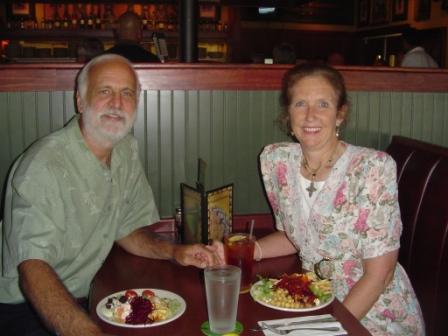
P.S. Even as we continue our struggle with cancer, our hearts and prayers go out to the untold numbers of victims of the earthquake in Haiti. Southern Baptists are already mobilizing assistance through the IMB and the state conventions. May God bless our efforts and those of other relief organizations.
Wednesday, January 13
4:15 PM Greek students! Matt Evans has just reviewed Burer and Miller's A New Reader’s Lexicon of the Greek New Testament. Check it out.
4:09 PM I just love biblical scholars who use horse analogies in their teaching and writing, as Tom Wright does in his commentary on 1 Thessalonians. He likens the human body to a horse badly in need of taming. "The perfect partnership of rider and mount, in which the animal knows what the rider wants and takes delight and pride in doing it, is not a bad image of the perfect partnership between the indwelling of the holy spirit [sic] in someone's life and the body's recognition of, and obedience to, the spirit's [sic] desires and promptings," he writes. To me, that conjures up a wonderful word picture, because for many years I was an avid equestrian. Wright is quite correct about the goal of every rider, and that is to attain a perfect harmony with one's horse. The horse is focused on obeying its master; the rider is focused on caring for his or her mount. This, to me, is partly what Paul meant by being "filled with the Spirit" in Eph. 5:18. Paul does not imply that the Holy Spirit of God is a mean and cruel taskmaster, whipping us into shape. No, God is infinitely patient with His children. He works with us -- trains us -- by gently and caringly nudging us from where we are to where we ought to be. To be controlled by the Spirit is to be gently controlled by God Himself, much like riders control the actions of the horses beneath them. Now, if you have never been on the back of a horse you can still understand what Paul is saying. But if you have ever been a rider, you might be able to catch the poignancy of Wright's analogy a little bit better.
Below: Here I am (in my pre-beard existence) on my horse Traveler just after we had moved from California to our North Carolina ranch in 1998. Trav had just retired from the race track and knew only one speed (which also happened to be my favorite): full throttle.
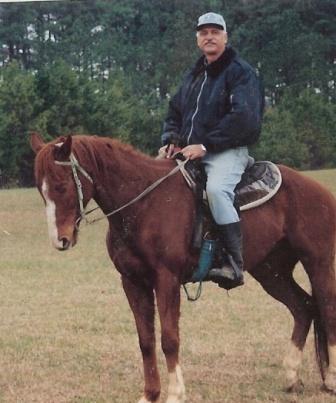
Being a Thoroughbred and designed to do only one thing (race), Traveler was more difficult to train than my other horse, a beautiful gray Arabian named Cody. Both geldings demanded a great deal of patience, but they responded beautifully to my slow and methodical training. I miss my horses today more than I can describe.

3:30 PM All I can say is "Ouch!"
3:25 PM Not that it matters much, but I have one thought to add to Henry Neufeld's discussion about Publishing a Scholarly Paper. Be sure that your paper adheres to the submission guidelines of the journal to which you are sending it. I have published in a number of journals (New Testament Studies, Novum Testamentum, Biblica, Westminster Theological Journal, Filologia Neotestamentaria, etc.), and every one of them seemed to have slightly different expectations. Editors are not inclined to look very favorably on authors who do not take the time to check out their submission parameters.
2:54 PM Think about it: In 5 years from now, the Internet won't look anything like it does today.
2:50 PM I simply cannot watch TV. Or at least not for very long. Everything moves too fast for me. Every change in scene is accompanied by a sound effect. The camera is constantly in motion. I am inundated with brief snippets of information.

My guess is that in this post I've already exceeded the attention span of most people.
2:43 PM My colleague Alvin Reid toots his own horn (that is not a criticism) in this wonderful new Vimeo. Kudos to his publisher, B & H, for producing this excellent overview of Alvin’s Evangelism Handbook.
2:35 PM The other day I mentioned the publishing goals that I set for myself upon graduating from the University of Basel in 1983 with my D.Theol. That was over 26 years ago! You'd think I'd be heading for the pasture along with my cows by now. Hardly. I feel I have more to accomplish for King Jesus today than I did between the ages of 30 and 56. And I've got lots of good role models in this regard:
Michelangelo painted The Last Judgment when he was 66.
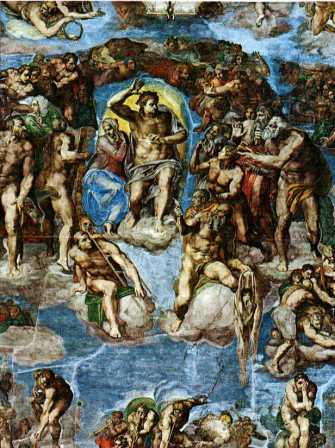
Benjamin Ririe retired as a missionary of the China Inland Mission at 70. At 80 he decided to learn Greek.
At 70 William Gladstone took up a new language and became the Prime Minister of Great Britain – for the fourth time.
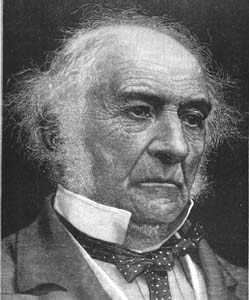
Alfred Lord Tennyson wrote Crossing the Bar when he was 80.
John Wesley was still preaching with undiminished power at the age of 88.

This week a student asked me, "Do you actually read your Greek, French, German, and Latin every day?" Yep, I do. The older I get, the more I want to know and serve Jesus with every ounce of energy in my mind and body. The greatest delight of my life is just living – helping Nathan on the farm, driving Becky to her treatments, teaching students to love Greek, preaching in foreign lands, serving in Ethiopia, investing in my grandchildren's lives. Every day I'm learning something new. This week I checked out of the seminary library every book written by a certain New Testament scholar from whom I feel I still have much to learn. I'm currently writing a couple of books of my own. I'm preparing to teach a new course this fall. I've already bought my ticket to Ethiopia for this March. I'll be there again in July, Lord willing. I guess you could say that I never want my students to be busier than their prof. I want to minister to others each and every day of my life. Carefully. Consistently. Thoroughly. Effectively. Graciously. Those are my goals at least. Even as I learn new truths, I never want to allow learning to become a substitute for putting into action the truth I already know.
Please forgive this lengthy digression. But I do want to make a point. I never want to rust out. A teacher best serves his or her students by modeling for them the sheer excitement of learning and growing. I had a teacher in seminary that seemed to run on auto-pilot. Even he seemed bored with his lectures. That's not for me. It's not for any of us.
I'd rather see a sermon than hear one any day;/I'd rather one would walk with me than merely show the way./The eye’s a better pupil, more willing than the ear;/Fine counsel is confusing, but example's always clear.
2:22 PM Thanks to Ekaputra Tupamahu, I now know about Dale Martin's online New Testament lectures. This is not to say, of course, that I agree with Professor Martin's perspective on the New Testament. In his very first lecture he says, concerning "Scripture":
The writing itself is not holy; it's only holy to people who take it as holy.
For me, nothing is more central to Christianity than the doctrine of divine inspiration. Still, if you want to know what a New Testament introduction class at Yale looks like, have at it.
2:18 PM Pope Benedict sets a good example for us all by forgiving the woman who tackled him on Christmas Eve.
1:33 PM In reading the blogs lately I've noticed that something seems to be going on. There appears to be a growing dissatisfaction with grumpy blogs and grumpy bloggers whose modus operandi (and even modus vivendi, it seems) is to bully and blast.
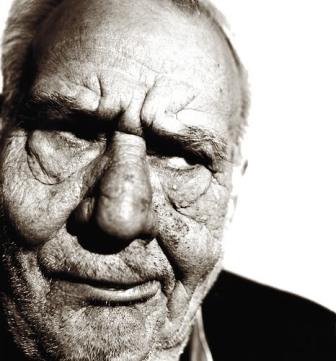
Harshly rebuking somebody on our blogs is very easy to do, and it provides a deep but spurious sense of moral satisfaction. Or we can say, if we like, that the passion for truth and morality easily paves the way for un-Christlike behavior. In condemning wrongdoers, it is easy for us to fall victim to wrongdoing. Isn't that true? John R. Mott once said: "The greatest hindrances to the evangelization of the world are those within the church." I think we would all do well to emulate Jesus, whose denunciation of the Pharisees issued not from a pompous height but from the way to the cross (see Matthew 23). I myself am asking the Lord Jesus to convict me where I need convicting in this regard. No doubt there is much more that can be said on this topic, but it is at least a start.
1:26 PM Here's an amazing statistic. For the years 2004-2008, Nielsen Book Ratings followed 1.2 million books. Of these, 950,000 books sold less than 99 copies each. This is according to one of my publishers. Unbelievable!

1:21 PM I love that Eric Carpenter. He's always thinking outside the box yet always proceeding cautiously when he introduces new ideas to his congregation. He's begun encouraging his people to ask questions when the sermon is over; see his post "Do You Have Any Questions?" Isn't that great?
Here's another question you can ask once you've had your say, pastor friend: "Anybody have a word?" This broadens the field of play considerably. Rather than simply responding to our finely crafted sermons, believers are given a chance to speak what the Lord has put on their hearts. Perhaps someone has a testimony or a prayer request or a Bible verse. I am glad to see that many of our congregations are becoming "people's churches." Christians who are alive to the life-changing values of the Gospel are not content to merely have their names written on a roll or to sit by idly while someone else does all the edifying. Church, let's practice the priesthood of all believers!
1:15 PM We are rightly concerned today about returning every-member ministry to our local churches. But does this also apply to the way we do foreign missions? Arthur Sido thinks so. Please take a moment and read his essay Should we support missionaries or native workers? I think that he is on to something very important. Just as our churches need to train "laity" for service, so also our missionary organizations need to learn how to equip and empower foreign nationals to do the work of ministry. Arthur raises an extremely important question in my opinion. Does missions today mean doing the work for others? If we conclude yes, then missions will exist to perpetuate its historic form. Fortunately this philosophy is being questioned today. Actually, in many places of the world missionaries are acting as assistants to the nationals in mission work. Our Galana clinic in Ethiopia is perhaps a good example of this. It is staffed exclusively by Ethiopians. It is overseen by the local Ethiopian church in Burji. We help the work by responding to the legitimate financial needs that exist there until the clinic becomes self-supporting. But the Ethiopian believers themselves have responsible trusteeship. How marvelous!
I truly believe that any missionary enterprise that lives only on the traditions of the past without recovering the biblical pattern for each new generation will stultify the work of God. Read Arthur's fine essay and see if you don't agree.
Below: Chaplain Solomon sharing the Good News with visitors to the Galana clinic.

1:08 PM What a joy! I had in my office yesterday a student who has decided to forego "vocational" ministry so that he can be a public school teacher. "That's my mission field and fulltime ministry," he told me. Amen! Working at a job has more benefits than just allowing oneself to be self-supported. Paul set a good example for us in this regard. By working as a tentmaker he would come into daily contact with people, and he would undoubtedly be able to enjoy innumerable conversations while dealing with customers. So blessings on you, young man, as you enter "fulltime Christian service" in the classroom, your "mission field" for Jesus!
12:55 PM Just back from the most wonderful campus on earth. I am so proud of my Greek class. Two students received a perfect 110 on their exam and thus received the much-coveted "110 Award" (a free copy of one of my books). In all candor, I've never found better examples of Jesus-followers who are more committed to knowing the Word of God and fleshing it out than my Greek scholars. I've discovered again and again that God can use what's between the covers of the book we call the "Holy Bible" to build strong, healthy lives. One of the things that keeps me blogging is a passionate desire to share with others the blessings in my own life. If I frequently mention my own life or marriage or career it's not because any of them are perfect. It’s because it's the only life, marriage, and career I know. I really want my students to see how blessed they can be if they understand and obey the words of Jesus. Our ultimate purpose in life is to glory and serve God – not to be happy, not to be comfortable, not to find "fulfillment," not even to love and be loved. It is only as we glorify and serve God that we are able to point others to Christ. Let me tell you, students – knowing this Christ will change your entire perspective on yourself, your life, your marriage, your everything! I long to communicate to every Greek student of mine that the living Lord Jesus has designed a way for us to make sense out of our crazy lives.
Many thanks, then, to my students for doing so well on their first exam of the course. Only 2 more to go!
Monday, January 11
5:40 AM Quote of the day (Will McCorkle):
Christians or at least evangelicals have not been seen as peacemakers in recent society. It is somewhat shocking to know that Evangelicals are one of the groups most likely to support U.S. military action. It would have been ironic for the early Anabaptists to think that it is the secular world who needed to lead the way in peacemaking rather than the church.
5:37 AM I've got a student in my J-term class who is using a Kindle edition of Learn to Read New Testament Greek. Actually I give him a lot of credit; personally, I don't think I could do it. I love the codex too much. You might just say that I have page-turning passion.

5:30 AM Someone has said, "Unconsecrated Christian wealth is the greatest hindrance to Christian progress." I'm inclined to disagree. We might just as well say, "Consecrated Christian wealth is the greatest hindrance to Christian progress." I think that Christians can be too generous. A New Testament example is 1 Thess. 4:9-12 -- the strange case of "the church that loved too much" by allowing certain believers to mooch off of the charity of their fellow believers. "Get to work!" says Paul. Giving can bless the work of God, and giving can hinder the progress in Christian work. For example, I am encouraging all of my students who are planning on taking a short term mission trip to save up at least half of their trip expenses themselves. If your trip costs $3,000, you can scrimp and save $1,500 of that amount. To do that would require you to set aside a mere $4.00 a day for a year. That's all! The ability to work is God-given, and it is valid stewardship to show donors that you are willing to do your part. That being so, Paul's words to the Ephesian elders need to be heard loud and clear:
I never wanted anyone's silver, gold, or clothes. You know that I worked to support myself and those who were with me. I have given you an example that by working hard like this we should help the weak. We should remember the words that the Lord Jesus said, "Giving gifts is more satisfying than receiving them."
I find that deeply challenging. Let every Christian make a note of Paul's attitude: I'll work myself to the bone before I take a penny from anyone!
5:22 AM It appears that Nolie loves dogs as much as his daddy does:
Sunday, January 10
4:52 PM Brief farm update: I just returned from the back 40. Even though I had on a shirt, sweater, parka, and heavy jacket I was still frozen to the bone when I got home. But what fun! Nate and I finished cutting a new fence line for our cattle. Hopefully we will put up the woven wire next Saturday (I'm working all week).
As you can see, we left just enough room between the trees to unroll the wire.
Here we are taking a break halfway through the job. The dogs are our constant companions.
We finished an hour before sunset -- a lot quicker than I thought we would complete the job.
And guess what? Nolan, who turns 7 months next week, is now saying "mommy" and "daddy." Amazing! We're still working on "Mama B" and "Papa B," but everything in due course.
Oh, we're having -- yeah! -- Chinese for dinner tonight. The Blacks will be joining us. Any guesses on whose doing the cookin'?
11:55 AM Look who I just bumped into while taking a walk:
Their church was cancelled this morning due to the fact that their clapboard building never got over 18 degrees inside. So I cooked everybody ham and eggs for breakfast, and now the boss man says we need to go outside and work on the fencing. So --
Hi Ho, Hi Ho, it's off to work we go!

10:22 AM 8 degrees in Waco Texas? Yep. See South can't shake cold spell. And it won't let up any time soon. Please keep your children and even your pets from playing on frozen ponds. Already two teenagers have died doing that in Georgia. Let's hope and pray that things get back to normal soon.
9:44 AM Bec and I are both staying home from church this morning. Her counts are dangerously low. As for me, being in church is just not the same without her. Know what I mean?
9:36 AM Someone asked me last week, "What do you miss the most about Ethiopia?" There are too many things to mention here. But at the top of list is the pace of life. Talk about being forced to slow down! Have you ever considered what a wonderful blessing that is? Becky and I sure have. As you know, Lord willing we'll be back in Utopia in just 9 short weeks (if Becky is healthy enough to travel). It will do us a world of good. Ministry is more than establishing clinics and teaching Bible studies. It's about people. A listening ear, a warm embrace, sipping buna (coffee) together, some gracious act -- these kinds of things show best our love for Ethiopia and for Ethiopians.
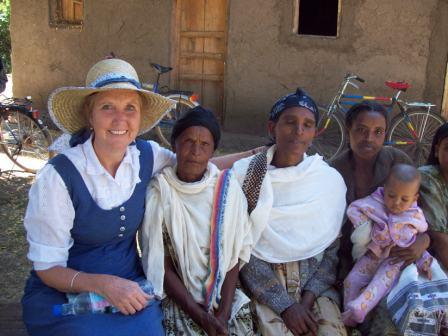
Will you join me in asking our precious Lord Jesus to allow us to return to our second home in March? If it be His will, of course. Thank you!
9:16 AM I know exactly how Californians are feeling this morning after the earthquake.

Been there, done that. Shake and bake. Bec and I resided in Southern California for 27 years. It's a great place to live -- except for the fires, floods, earthquakes, riots, and smog.
I kid. I kid.
8:48 AM You know you're getting old when Rod Stewart becomes a pensioner.
8:38 AM Today I'm working on our first Greek exam of the J-term. It will be a take-home exam that I will pass out on Monday. The students will grade them when they return to class on Tuesday morning.
This idea of a take-home exam might not fit in with your notion of pedagogy. Temptation is real, the evil one very much alive, you say. And you are right. In my 33 years of teaching, one major heartache has pained me more than any other: rationalization. I mention it here because I want my students to understand that in trusting them not to cheat on their exams I am also fully aware that the human heart is prone to set truth aside, often brashly. But one thing I do know: your cheating will reprove you. It will ultimately provide its own consequences, and believe me, it's not worth it.
As I said on Friday, we have one rule in this class: We must all appear before the judgment seat of Christ; act accordingly. If I can't trust you with a take-home exam, how can God trust you to represent and serve Him?
Think about it.
8:20 AM The Christian Science Monitor (which is an excellent source for news) has published an exposé of Al Qaeda called Connecting the terrorist dots of 2009. It is an outstanding piece. Tucked away on page 2 is this gem:
They [terrorists] are lonely travelers not involved in social or political action or even religious predication. They find socialization in personal bonding with alter egos, either from a local closed group of buddies (the 9/11 pilots, the London bombers of 2005), from a training camp in a remote place of Pakistan, or just through chatting on the Web.
Perhaps bloggers aren't the only people who sometimes lead virtual lives. Do read the entire piece by Oliver Roy. The U.S. needs to come to terms with the nature of terrorism now or we will regret it later.

8:04 AM You simply must read Allan Bevere's comments on John the Baptist. He's not a very nice person, says Allan.
What nerve this desert wild man has to stick his nose into everybody's personal business!
Of course, if you are going to act like a prophet today and call people out, you had better be sure your own house is in order.
7:54 AM Andy Bowden asks a good question about church and culture. I see he is also a fan of Jacque Ellul. Good for you, Andy!
7:22 AM Here's a thought that belongs in the "for what it's worth" category.
Los Angeles Dodgers pitcher Orel Hershiser tells of the time when Frank Sinatra gave him and his wife Jamie an autograph. Sinatra signed it "To my great friends" and then spelled their names as "Oral and Jane." Said Hershiser, "Goes to show how good of friends we really were."

Perhaps this story illustrates one of the pitfalls of blogging. How well can we really get to know a person via the internet? Casually at best. Sometimes we think we have developed an honest-to-goodness relationship with a certain blogger whom we've never met in person. We admire him or her for any number of reasons. And then they make a mistake -- to which we are all prone -- and we feel let down. We then go from appreciation (or even adulation) to the opposite extreme. That is not healthy.
Please don't misunderstand me. It's a good thing to blog. It's a good thing to enjoy "relationships" with the blogging community. But it's a real concern to me that we sometimes have unrealistic expectations about what bloggers "should" or "shouldn't" be. Honestly, if we take blogging that seriously we probably need to shut down our computers for a few days.
I have said elsewhere that you will never find a perfect blog or a perfect blogger. That is certainly true of me and my blog. There's a point that I don't want you to miss here. It has to do with the way we "personalize" what bloggers say to the point that we believe we have become "friends" with them. This, dear reader, is humanly impossible. Let's honestly admit that it is possible to make too much of this blogging business and use it as an excuse for failing to pursue relationships with the people all around us.
7:15 AM Last Friday my Greek students and I had a good laugh over adjectives. We had just gone over the vocabulary to chapter 6, which included agathos and kalos. I told them the former could be glossed "good" while the latter could be glossed "good" or beautiful." That is, kalos sometimes refers to moral goodness and sometimes to external goodness (i.e., beauty). Then I asked them which of the two words the apostle John had used in John 10:11 when he quoted Jesus as saying, "I am the good shepherd." They all agreed it was agathos. Surprise was on everyone's face when I said, "Kalos." Jesus -- the good-looking shepherd!
What on earth did Jesus look like? Was He tall, dark, and handsome? Nobody knows. The same is true of every Bible character. Yet isn't it also true that beauty of character can show up on one's face? We read of Moses that "he didn't know that his face had shone" (Exod. 34:29) and of Stephen that he had "the face of an angel" (Acts 6:15). Their faces had a radiance about them that was noticeable!
People look the life they live. This is one of the many things I admire about Becky so much. She is always cheerful, whether she is answering the phone or buying groceries or talking with her doctors and nurses. I know that behind the glow there is an inner joy that is full and unspeakable.
How's your face?
7:07 AM Calling all (fellow) organ lovers. On Sunday, Feb. 8, an organ concert in the Duke University chapel will celebrate the return of its newly reconditioned Aeolian organ (photo). The event, which is free of charge, starts at 4 pm. For more information, go here. I've attended a good many concerts in the Duke chapel and have rarely been disappointed.

Saturday, January 9
8:51 PM I can't discuss the details yet, but things are in the early planning stages for a celebration commemorating the 500th anniversary of the printing of the Greek New Testament portion of the Complutensian Polyglot in 1514. That's only 4 years away. The venue will be Spain, of course. I can't wait for the day to arrive. More later.
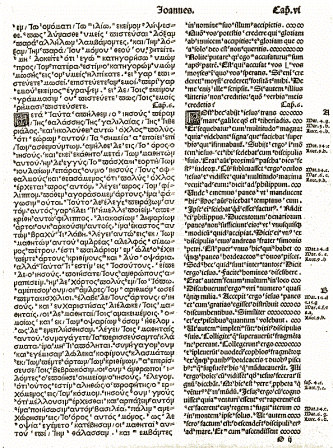
8:35 PM Oshe reports:
1) The guard house and the staff room have been completed at the Galana clinic.
2) The nursing staff is very excited to hear about our new ultrasound machine. They look forward to being trained on it in July.
3) The solar hot water heater was successfully installed. Unfortunately, the water pump needs replacing so there is still no running water at the clinic -- yet!
4) The ambulance is in need of new tires. Apparently the clinic has already gotten good service out of its vehicle.
Talk about reasons to praise King Jesus! One of my favorite Bible characters is Igdaliah. Possibly you've never heard of him. Yet in Jer. 35:4 he is called "the man of God." To me he stands for all those committed Christians who live and work in relative obscurity, faithfully doing the work of the Lord, day in and day out, with little or no public recognition. All of these people are great in God's eyes and bring Him glory. Indeed, the name Igdaliah means "The Lord is great." How appropriate! To all of the Igdaliahs who serve Jesus so selflessly and so well in Burji go my sincere love, thanks, and prayers. Can't wait to see you in March when (Lord willing) B and I return to Burji.
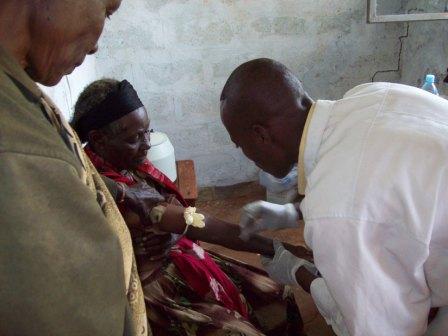
3:35 PM Here's a story for my doctoral students. It was in 1985 (I believe) when I spent an absolutely unforgettable weekend in Jerusalem. Being a church-goer, even when traveling, I decided to make the most of my stay in the historic city. On Saturday (Shabbat) I attended the famous Narkis Street Baptist Church, where Robert Lindsey (of Jerusalem School Hypothesis fame) was pastor. On Sunday, of course, I attended services in an Arabic-speaking congregation. (Thankfully, translators were present; I speak no Arabic.) What to do on Friday night? Well, it just so happens that the Dormitian Abbey had vespers that evening and, since the Benedictine monks there spoke mostly German and I had a good handle on their mother tongue, I thought I'd attend. Boy was I glad I did. I hit it off immediately with one of their leading monks, who offered to take me to the church dome the next day to take panoramic photos of the city. This was a high honor, especially because the dome had long before been closed to the general public.

The moral? You never know when a knowledge of German will come in handy!
2:55 PM Check out Andy Rowell's list of books he is currently reading. About one of them (the topic is that of "becoming a professor"), Andy comments:
It strongly emphasizes writing and publishing.
I happen to be in complete agreement with that philosophy! Not that it matters much, but when I graduated from the Uni Basel in 1983 I set for myself a goal of writing one book every 5 years and one major journal article every year. Currently I am ahead of schedule; but my point is that having a schedule -- setting publishing goals -- can be extremely helpful, especially when you are just starting out.
By the way, the book Andy mentioned is From Student to Scholar: A Candid Guide to Becoming a Professor. It's been added to my must-read list. Thanks for mentioning it, Andy.
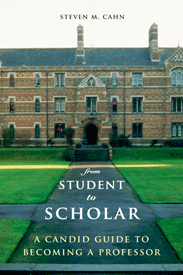
2:15 PM Praise the Lord! All day long Becky has been trying to get through to Oshe (pictured) down in Burji, Ethiopia, and she just now got through. Amazing -- this very moment she is talking to someone in one of the remotest parts of Africa. They're discussing our upcoming visit in July. Report later.
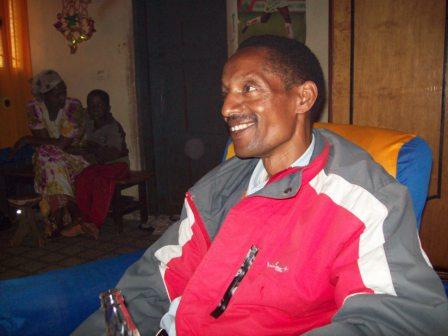
1:58 PM The ipsissima verba versus ipsissima vox debate continues over at Brian Fulthorp's site. By the way, Brian's post illustrates the absolute necessity of knowing (at least some) Latin for New Testament studies.

1:52 PM Read Eric Carpenter's review of Mega Belt. His conclusion:
Overall, Megabelt has some good qualities. However, it is my opinion that the author missed his chance at writing a book that would have great impact on the church. I wish this book could be re-written with more grace, less sarcasm, and no crudity. If a revision was done well, then I think churched people of the South might be willing to read it and think about the important issues it raises.
1:46 PM Just took a long walk on the farm -- one and a half hours worth of nothing but sheer delight. I think even the doggies were more tired than I was when we finished. Hey, why have a farm if you don't enjoy it?
10:13 AM Along with Tony Siew, I'm rejoicing that the ban in Malaysia on the use of "Allah" by Christians to refer to God has been lifted. This is good news indeed! Here's Tony's peroration:
I believe if we are rational and objective, Muslims and Christians can live in peace and harmony. By the use of the word "Allah" it is never our intention in anyway to confuse Muslims or demean Islam. No confusion should or could arise if we are open to facts, logic, rational arguments, linguistics, historical and biblical scholarship, not to mention the legal and constitutional foundations underpinning Malaysians' freedom of speech and religion as decided upon by the High Court.
9:57 AM Just went over to the Blacks and found them still sound asleep. Can you believe that? But all is not lost. I snapped a couple of photos yall might enjoy.
1) I never tire of looking at this barn that Nate and I built from scratch.
He'd always wanted to have a gambrel roof hay barn. It took us months of labor. Ah, but the memories. I must be an old geezer because I'm sooo nostalgic these days. Just think -- if that big old barn consisted only of cedar posts. How gross! Or of pine rafters. Where would the building be? Every single post, beam, rafter, nail, plank, and piece of tin in that barn is essential. There would be no barn without each part doing its job. Let's face it: that's the way the Building of Christ is supposed to work. So be prepared for God to use you. If you're a nail, be a nail. If you're a great big cedar post, be that post. Let's find out what part of the building we are and be faithful to our role. This means, among other things, that we never have to compare ourselves with anyone else in the building, right?
2) Now here's a great picture because it shows mama cow defending her little one against all enemies, real or supposed -- including our dogs.
It's a dog's instinct to herd; it's a cow's instinct to fend off herding dogs when their little ones are nearby. Nature working with nature. Cowardice in the face of danger has a way of disarming us, of robbing us of our testimonies as Christians. It injures our relationships with others. We simply must stand firm where we need to stand firm. That's one reason I love the Anabaptists so much. Their martyrdom is exemplary as far as I'm concerned. The fierce grip of panic never immobilized them. They just kept on living their lives, kept on sharing their faith, kept on preaching the Good News, kept on loving their enemies, kept on sharing their earthly goods, and kept on being faithful to their convictions even unto death. In this regard, Brother Arthur recently made a good observation in his post on Felix Manz:
How I wish we had more Christians today who had the force of conviction of men like Felix Manz, men willing to abandon all for the truth and who had the courage of conviction to stand up for the Gospel of Jesus Christ in the face of real persecution, men who were unsatisfied with the "halfway" measures of the magisterial Reformers and sought a full restitution of the Biblical pattern for the church.
"Whom shall I dread? Who will intimidate me?" asked David. Not King David, but little shepherd boy David. Not even a Goliath could intimidate David because he knew that the the battle is the Lord's.
Well, I hope you enjoyed these pictures as much as I enjoyed taking them.
8:38 AM Arthur Sido writes:
I commend a simply wonderful word from my sister Becky Lynn Black. I can only pray that in my good health I could show a fraction of the grace she shows struggling with cancer. Please read Fatigue and Me and join me this evening in praying for Becky.
Thank you, my brother. We have a major meeting on Monday with B's oncology team at UNC to determine where we go from here. My only desire is to be that obedient child, that pure bride, that healthy, trusting sheep in God's flock that experiences great intimacy with Him.
P.S. I had my morning devotions in Proverbs 31. I kept thinking to myself, "That's Becky, that's Becky."
8:33 AM A tip of the kepi to Brian Lilly for pointing us to this excellent essay on church membership. It has provoked a great deal of discussion. Why not jump in? A teaser:
But what happens when, largely speaking, there is little difference between the culture and the church? How do you identify with one group over the other? If your life doesn’t set you apart, what does? Is the answer a class; signing a form?
What if a local church expected its people to live differently than the rest of the world? And what if we actually believed that Jesus made us new creatures and we put off the old, what if we lived in love, what if we bore one another’s burdens, what if we believed the essential truths of Scripture and they made a difference in our lives? Would all of this serve as “church membership?”
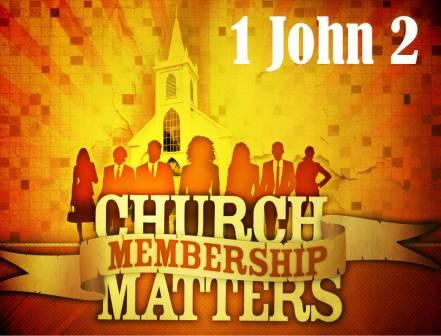
8:18 AM Many thanks to Nijay Gupta for noting the arrival of the latest issue of the Journal for New Testament Studies. I am eager to take a look at Poirier's "The Synoptic Problem and the Field of New Testament Introduction." It's amazing how difficult it can be to cover that topic in the course of a brief survey.
8:07 AM Jim West remembers Emil Egli. Egli's works on the history of Anabaptism and the Reformation in Switzerland are unsurpassed. I remember reading his classic Die Schlacht bei Cappell 1531 just before I visited the famous battlefield in 1983. Egli also gave due attention to the Anabaptist congregation in Sankt Gallen, which is still very much a leading congregation among the Swiss Baptists (our congregation in Basel was tiny in comparison to theirs). Thanks, Jim, for reminding us of the life and work of Emil Egli. He truly was "astonishing."
Below: The quiet village of Kappel am Albis, site of Zwingli's death.

7:50 AM Matt Evans interviews Ben Witherington over at BROADCAST DEPTH. Well done, Matt!
By the way, it's sure nice to know that brother Ben is not a prophet or a son of a prophet. Actually I can top that. I am not a prophet or a son of a prophet and I even work for a non-prophet institution.
7:44 AM See what Nolan gave his Mama B the other day? Ain't he sweet?
7:35 AM (Inane) quote of the day:
"My family will not be shopping at Ragland Piggly Wiggly stores anymore or anything else they own…. I don't shop at places that think it is OK to stand next to people who don't believe the Bible is all true."
Source The Bible and the Alabama race for governor. Read it and weep.
7:23 AM Thanking God this morning that Johnny Hunt's cancer surgery was successful.
Friday, January 8
9:40 PM Is your dog an Einstein or one of the 3 Stooges? This link ranks your breed's intelligence from brightest to dullest. I'm not at all surprised that Shetland Sheepdogs made the top 10. And this You Tube shows how dogs can read our body language 90 percent of the time. (No, I don't agree with the evolutionary perspective in this video.) I don't know about you and your dogs, but my puppies are super sensitive to my moods. Plus they're just plain fun to have around. And I say this as someone who grew up without any pets whatsoever. Anyhoo, please do watch the video. You will thoroughly enjoy it, especially the part when Dog knows when he can get away with "stealing" the treat placed before him. It's all in the eyes.
8:58 PM You can get a sneak preview of this Sunday night's TLC program "Brace for Impact" here.
8:08 PM Can you believe it? Ethiopian champion long distance runner Kenenisa Bekele is running in a 9-mile outdoor race this weekend in -- are you ready for this? -- "Edinbrrr" Scotland. You gotta give the man a lot of credit. Hope he wins.

7:50 PM Becky, who has been experiencing fatigue recently, writes about it in her latest essay. It's called Fatigue and Me. I know you will enjoy reading it as much as I did.

6:22 PM I was just telling Becky over a wonderful supper of chicken, rice, and broccoli-carrots how tired I am -- I am tired, tired, tired. I taught a total of 15 hours this week, full throttle too (that's how I do most everything). That, to me, is like preaching 30 sermons in one week. I'm usually wiped out after preaching only one sermon! But it's a good tired, if you know what I mean. It's what I call restful rushing, co-yoked to Jesus, whose yoke is easy and whose burden is light. I was also telling Becky over supper that I sometimes feel like I'm a surgeon training residents to perform operations. Our science -- the science of biblical interpretation -- is just that precise and difficult. That's because between us and the biblical text of the past are enormous walls -- linguistic walls, cultural wall, conceptual walls, historical walls. My task as a professor is to equip my students with the tools that will enable them (or at least help them) to transform those walls into panes of glass whereby they can see what the ancient text means while at the same time helping them to avoid transforming those walls into mirrors that only reflect their preconceived conclusions as to what the text means. So, as I look out over my class of eager students, I can almost see them wielding their scalpels, learning how to "cut it straight." I know that sounds like a silly analogy, but that's how I view what I do.
Speaking of work, I was taking a rest this afternoon when Nate called and asked if I could help him with a couple of farm projects this afternoon. Yep, I said, be glad to do it. We unloaded some wood he had in his trailer and then put together this load of 60 bales for a delivery to Hillsborough, NC, tomorrow. It's a new customer and another feather in Nathan's cap.
Then it was off to feed the cattle on ground that can only be described as tundra. I am told that we will have temps in the 40s next week. If so, the "heat wave" can't begin too soon as far as I'm concerned. I think this mama would agree.
Oh, another piece of good news, at least to Nate and Jessie's dog Sheppie. Chloe (background) has just come into heat, which has made Sheppie (foreground) one happy little doggie. Can't wait to see their pups. They'll be teeny tiny, that's for sure.
It's nice to have such good fellowship and satisfying work in the midst of a selfish, disconnected society. What a blessing! I do not take it for granted.
2:55 PM A reader just sent along this link: DeRouchie Challenges Members of the Evangelical Theological Society to Keep the Biblical Languages in Their Curricula. Thank you, Kyle, for the heads-up.
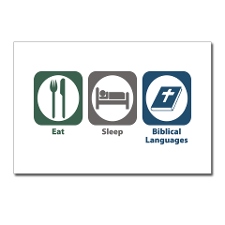
I can't speak for any other institution, but here at SEBTS we're not just retaining the biblical languages, we're ramping things up. Last year we began teaching Aramaic regularly, and this fall I hope to offer a team-taught course (with Bob Cole) in the Septuagint in which each and every passage will be carefully exegeted in both Hebrew and Greek (and, if I get my way, in Latin, German, French as well!). Plus we have several students who are doing their doctoral work in the languages (I currently have one student who is writing his dissertation on the participles in Hebrews). What fun! Where will it all end? May it never end!
2:35 PM Rick Brannan offers a brand new translation of Polycarp's Letter to the Philippians. Here's a sampler:
I rejoice with you greatly in our Lord Jesus Christ, having welcomed the replicas of true love and having sent on their way, as was incumbent upon you, those confined by chains fitting for saints which are the crowns of those truly chosen by God and our Lord.
Thank you, Rick, for this labor of love!
2:30 PM Quote of the day (Henry Neufeld, responding to Ann Coulter):
I'm not going to compare Christianity to Buddhism or any other faith. I have never found much value in comparison and contrast, especially by someone like me, who has practiced one but not the other. What I will say is that what Christianity demands of me is redemption, and it would demand the same of Tiger Woods.
Having God's forgiveness in the midst of all that is life-changing, indeed critical, in my view. But it still leaves the hard work of my forgiveness of myself, my gaining forgiveness from others, reconciliation, and recreation.
It's not a deal. Its' a gift. And inside the gift package is some very hard work.
2:22 PM I see it's time for grades over at the White House. Brad Reed gives the president a solid "C" for 2009. My score? Not nearly as high. To wit:
-
The never-ending "war on terrorism" just keeps on going. (Obama, like Bush, says we are at war with "terrorism." The reality is that we are at war with "terrorists." The distinction is important.)
-
The U.S. remains in a perpetual state of emergency. (Let's see, is the danger level still at Orange? Or is it Red?)
-
Obama will keep Guantanamo open for the foreseeable future.
-
Detainees will continue to be shipped off to who-knows-where to "cooperating" countries that have no compunctions about the use of torture.
-
The federal government can still listen to your phone calls and read your emails without a warrant.
I would give Mr. Obama a "D" grade at best. Then again, this is only the first quarter in the school term. There is room – and time – for improvement. But my patience is beginning to run out.
2:09 PM Just back from the seminary. I left church on Wednesday night after prayer meeting and came straight to campus. Prayer meeting, by the way, was phenomenal. I'm still trying to grasp God's greatness in allowing me to be involved with such a wonderful group of men and women as our Ethiopia 2010 team. I sensed a desire among us to give God all of the glory. Ultimately, I think the greatest blessing in prayer is not getting what we ask for but rather becoming imitate friends with God -- the kind of friends that He can trust the answer to. Charles Spurgeon once said that prayer is the slender nerve that moves the muscle of God's omnipotence. Amen! Thank God we can go before Him with the assurance that He is aware of our needs and that we can acknowledge His divine adequacy!
I gotta tell you, this J-Term class is special. I mean, why would anybody want to study Greek when they could be learning "Five Simple Steps to Increase Your Sunday School Attendance"? Students, as you passionately pursue a growing intimacy with God, I hope and pray that your Greek studies with allow you to know Him more deeply than ever, so that you can follow Him in obedience and love. It all begins with a right relationship with our Greek Teacher (and that ain't me!). Do not forsake your devotional time with Him for the sake of your studies. That's getting the cart before the horse. Your study of Greek can be ineffective and even wasteful if you do not start out with the proper motivation. At any rate, thank you for working so hard and doing so well during our first week of class. Just think -- only two more to go!
Wednesday, January 6
4:50 PM Here's a thought-provoking essay on The power of touch. "The power of touch is unbelievably healing," writes the author. Quite true. The entire sanctification process with all that it is wrapped up in it revolves around the physical every bit as much as it concerns the spiritual. Just ask an Ethiopian believer. It is not uncommon to kiss three times on the cheek in addition to shaking hands and hugging. I have had my arms gently stroked by children and adults alike who are fascinated with body hair. Even the smallest child will eagerly shake your hand. Men hold hands with men, and women with women. Touch is truly a powerful thing, and you can't be afraid of it if you want to serve Jesus in Ethiopia.
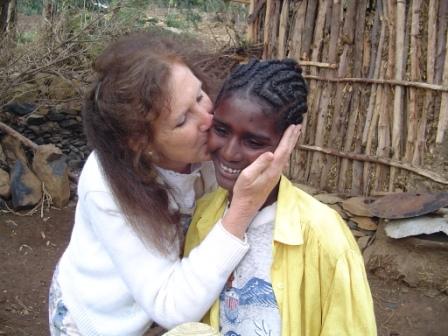
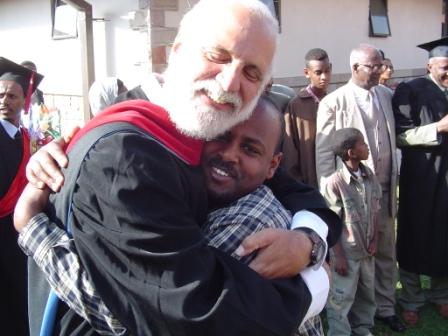
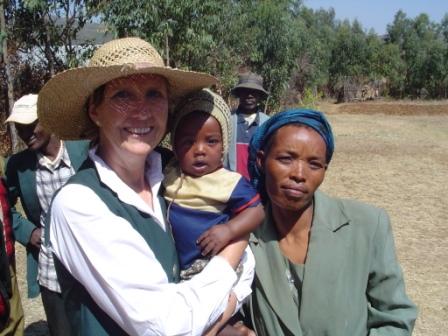
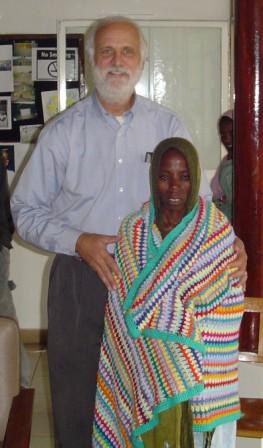
4:46 PM Mike Knox reviews Grammatical Concepts 101 for Biblical Greek. This is a timely book that had to be written. Highly recommended.
4:40 PM I am glad to link to my colleague Alvin Reid's new website. Easily readable and referring even the well-informed Christian to a wealth of helpful studies, Alvin's site raises questions and points in directions all too often avoided by believers. Give it a look-see.
4:34 PM Michael Westmoreland-White has a New Year's resolution: Check and answer emails more regularly. May God bless you and enable you to fulfill your resolution! I cannot prove it, but I think that Jesus would have answered His emails punctually. It's called basic courtesy. We are to use modern technology but not abuse it. For what it’s worth, Michael, I have a 24-hour rule that I try to live by. Usually I respond even more quickly than that unless I’m traveling.
4:26 PM Here's a Greek Wordle for the Gospel of John.
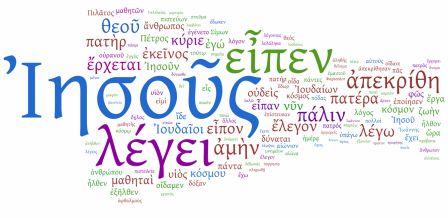
Amazing! I wonder what Hebrews would look like, Gary. By the way, while you’re at Gary's site, check out his Top Ten Things To Do While Learning Greek.
4:20 PM Good for the president. Last night he went before the nation and the world and basically said, "We blew it." Talk about being forced to practice what you preach! Had Mr. Panty Bomber been less incompetent, he would have succeeded. And our government would have been responsible. After 8 years of taking my shoes off and checking my hand luggage, that's hardly a comforting thought. People like you and me find ourselves handling dangerous weights of anxiety on extremely thin threads of patience. The president's message yesterday was, "Let's stand firm in tough times." Okay, Mr. Obama, I'll do my part. But it would be nice if our government could to learn to connect the dots. It would also be reassuring to the public if the buck stopped somewhere. Whom will you hold accountable?
4:12 PM Arthur Sido gives The Anabaptist View of the Church a thumbs up.
4:09 PM Why is it we can pass annual resolutions about alcohol and never mention gluttony or cigarette smoking?

I often hear Baptist preachers joke about their enormous waistlines. To be sure, self-control never saved anyone, but it ought to be the mark of the saved.
4:01 PM Brit Hume the evangelist? Apparently so.
"The extent to which he can recover seems to me depends on his faith," Hume said. "He is said to be a Buddhist. I don't think that faith offers the kind of forgiveness and redemption that is offered by the Christian faith. So, my message to Tiger is, 'Tiger, turn to the Christian faith and you can make a total recovery and be a great example to the world."
And the flack Hume is getting! But not to worry, though – evangelical pundits are defending him left and right. Their message? People who claim to have reached such stratospheric heights that they never experience controversy or clash with the culture have gotten beyond their Lord who was often engaged with His enemies. Or something to that effect.
The problem with this way of thinking is that Jesus was targeting religious hypocrites, not people like the woman at the well who were acting like the lost folk they were. Just my opinion, but Tiger needs a Jesus follower to befriend him, not someone to give him a public lecture on TV. Any takers?
Tuesday, January 5
6:05 AM Oh, before I forget -- here's a link to the hilarious video we talked about yesterday in class: "What are you sinking about?" Yep, for some folks, the "th" in theta is just about impossible to pronounce.

5:53 AM Today we introduce the Greek verb system. Can't wait! Those of you who have studied Spanish will have an unfair advantage over the rest of us. (To those of you who know Hawaiian Pidgin, my first language, all I can say is -- it ain't gonna help.) Greek, like Spanish, can have single word sentences because the subject is built into the verb.

We'll also produce our first translations today. For some helpful tips on how to go from Greek to English, see Alan Knox's essay, First steps in translation. In fact, Alan's website called Greek Class is a great resource. Check it out!
5:45 AM This is sick.
5:40 AM Tom Engelhardt and Nick Turse want to play 10 Questions. Unfortunately, it isn't a game. They write:
We know one thing: 2010 will be another year of war for the United States and, from assassination campaigns to new fronts in what is no longer called the Global War on Terror but is no less global or based on terror, it could get a lot uglier. The Obama administration may, from time to time, talk withdrawal, but across the Middle East and Central Asia, the Pentagon and its contractors are digging in.
Personally, I am convinced that Mr. Obama will continue 43's policies in the Middle East. The two major political parties are simply mutating organisms of the same species. They change constantly, but only in minor ways. Engelhardt and Turse present a harrowing picture of national danger that no one will welcome but that none should ignore. Thank you, gentlemen, for your extensively researched report -- and for your tough-minded realism.
5:33 AM Do you know where the expression "hocus-pocus" comes from? The jargon of the medieval church. The liturgy was done in Latin, of course, a language that was "all Greek" to most church attendees. Thus, to an uneducated ear, the priest's words "Hoc est corpus meum" ("This is My Body") sounded like hocus-pocus.

The Anabaptists, laicists that they were, would have nothing to do with such nonsense. They countered the church's sacerdotalism with a partiality toward the vernacular. One of their opponents, a Dominican monk named de Bourbon, tells us about this:
They know the apostles creed excellently in the vulgar tongue; they learn by heart the Gospels and the New Testament, in the vernacular and repeat them aloud to one another....
Now, as everyone knows, I have nothing against Latin. I love that language. In Basel I had to swear my doctoral oath in the Latin language. I read Latin daily (especially my Latin New Testament). But Latin is not a holy and hallowed language. Not now, not then. The Swiss Anabaptists preached, prayed, and spoke in the vernacular, just as we Americans do today. Yet another reason to love the Stepchildren of the Reformers!
Monday, January 4
6:53 PM B's gone off to bed, bone tired. I just spoke with her parents in Dallas. All of us are praying fervently for Becky tonight. When one member of the Body suffers, all suffer.
Thanks, friends, for praying. Thanks for taking the initiative. Christ is just what is needed in this situation!
5:50 PM Someone has said, "The problem today is not that we are over-worked; it's that we are under-motivated." Well, let me tell you, our Greek class today was motivated with a capital "M." My job is to give them a small shove, an impetus, a motive. Their job is to revel in one great language. A verse keeps coming to my mind: "You will not have to teach your neighbor or your brother and sister, saying, 'Know the Lord,' for everyone will know me, from the least to the greatest." Isn't that amazing? Even the youngest Christian can know the Lord, personally and directly, through His Word. And there is nothing more powerful than an encounter with that Word in its original languages. So, to all of my new students cutting their eye teeth on Greek this week, I say: Do a great job! Do it for the Lord! Do it for His dear sake! Do it so that you can know Him personally!
As you get started, there are two wonderful, indispensable websites you should know about. Here they are. Use them to their max.
1) Rod Decker's New Testament Resources.
2) Mark Goodacre's New Testament Gateway.
Both gentlemen are also avid bloggers (as are all well-educated, intelligent, and good-looking people.)
P.S. Scripture says, "See to it that no one fails to obtain the grace of God." Please do not take your studies -- or God's grace -- lightly. Apply yourselves, and then use what you have acquired in humble service to the world around you. That is what will make the world sit up and take notice as they see you living a new kind of life, a life of selfless, scandalous cross-love.
P.S.S. Send me an email if you have any questions. I'd be glad to help.
5:12 PM Just back from UNC Hospital. Becky had her 9th (of 30-35) radiation treatments today. She also had her blood work done again, and we just got the news by phone: Her counts are way too low for her to continue radiation, so she is on indefinite hold. I am in a bit of shock. Rather than getting clearer, things are getting muddier. But God saw this coming even if we didn't. An accident? Bad luck? Are you kidding? Jesus is still upholding the universe (including my own little corner of the universe) by His powerful Word. So says Hebrews, and so I believe. Right now, this very moment in Southside Virginia (and wherever you may live too), Jesus is holding everything in place, whether large or small. We're told it may be two weeks before Becky can resume her treatments. Whatever happens, our goal is to meet every situation, not with human wisdom, but with divine, not with our strength, but with God's.
6:32 AM The world will end on May 21, 2011. Just thought you ought to know.
6:20 AM Time to throw myself into teaching. It's a new day, a new class, a new set of students. Thank God for the joy and wonder of it all. And to think I am paid to do it.
P.S. Greek students, be sure to take a look at the vocab cards that Richard Sugg has prepared. Printable too.
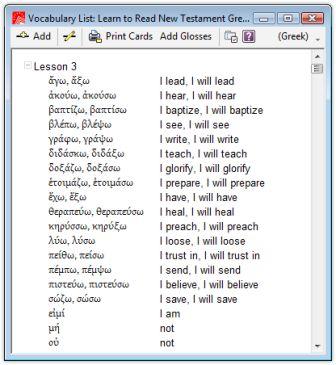
Sunday, January 3
6:45 PM Prayer alert! This Wednesday night at The Hill we will be gathering for a special time of prayer for our Ethiopia 2010 team. Nothing is taught more firmly or frequently in the New Testament than the priority of prayer in missions. Of course, this is easier said than done. James puts it quite bluntly: "You have not because you ask not." So please do join us if you can. The meeting starts at 7:15.
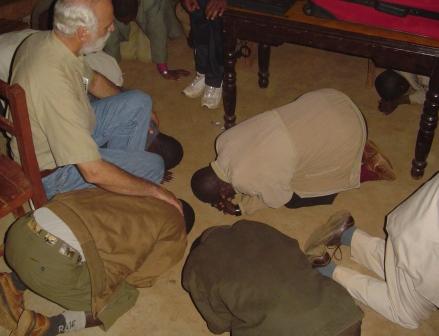
6:14 PM Praise the Lord! Lobe den Herrn! Laudate Dominum! What a fantastic day it's been. One of the best I think I've ever enjoyed. First off, I had holy and hilarious fellowship at the Hill with the brethren (and sistern). Then the Blacks joined us for Sunday dinner. The ladies served up a scrumptious meal of beef, parsley potatoes, and carrots. Poor little Nolan has been suffering from a head cold, but he was as pleasant as punch after he had napped in our living room. Here he is sharing a happy moment with his mommy.
Daddy makes sure his little son is bundled up for the trip back to Maple Ridge (Nate and Jess's farm).
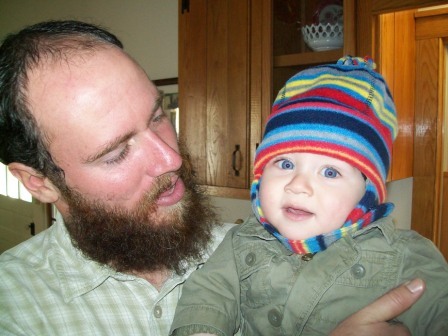
The boss man and I spent the afternoon working outdoors in the most inhospitable weather imaginable -- the word "frigid" is the only one that comes to mind. We had three goals in mind for today: spread manure, cut firewood, and unload the windows that Nate and Jess had picked up in Lancaster, PA, this past week for their new addition. The ground, as you can see, was quite frozen -- a good sign for anyone needing to skubalate.
Nate and I really do enjoy tossing horse manure, as strange as that may sound. We especially like to see who can surreptitiously get dung on the other guy before he notices and then raps you on the head with his pitch fork. (Not really.)
Then it was off to cut and split firewood. I don't know about you all, but it sure has been a cold winter where we live and, although Becky and I have 5 wood burning fireplaces in Bradford Hall, we have used them very little since our lives have become so busy with hospital visits and all. Our central heating has done the job instead. Nate and Jessie, on the other hand, heat their entire house with wood. Thus, in cutting firewood, we can kill two stones with one bird: we provide heat for the Blacks' house, and we also thin out our pine stands.
Nate, by the way, is masterful when it comes to his chopping technique. I could watch it all day long. What a loafer I am!
Et voila! Not bad for one day's labor, eh? I figure this collection will last Nate and Jessie for about a week, then it's back to the old chopping block.
Our final project du jour was seeing that all the windows that Nate had bought were safely ensconced in one of our corn cribs.
I can't wait to see these old beauties in the Blacks' addition -- that will be real purty.
I've saved the best news for last. Nolan now has -- count 'em! -- 6 toofies. That baby is growing up much too fast, I tell you. Why, he'll be out cuttin' firewood with his pappy before you know it.

8:41 AM I'm eager to be with the Bethel Hill family this morning. Bec will stay at home, her blood counts having dropped off this past week. The weather continues sunny and cold: right now it's 19 degrees in the Virginia Piedmont.
8:36 AM As a teacher, I am finding it more and more challenging to teach the current generation of young scholars. In 2005 the Business-Higher Education Forum released data that showed that 15-year old Americans are worse at problem solving than their peers in 25 countries. Knowledge of foreign languages is even more abysmal. Add into this mix a name-it-and-claim-it mentality that seems to pervade our evangelical subculture and the result is that some students no longer tie success in the classroom to the notion of hard work.
Learning Greek is 25 percent understanding and 75 percent perspiration. J-term Greek students, be prepared to work, and to work hard. Remember, too, that there are no prerequisites for this class: I start literally from scratch and will try my best to explain how Greek works in simple, understandable language. But in the end, success will depend on your efforts. Above all, please do not get even one lesson behind; catching up in language studies is almost impossible.
Set your sights high; you'll never reach higher. Rely completely upon God's strength to accomplish your goals. And remember the words of martyred missionary Jim Elliott: "Wherever you are, be all there, and live to the hilt whatever you are convinced is the will of God for your life."
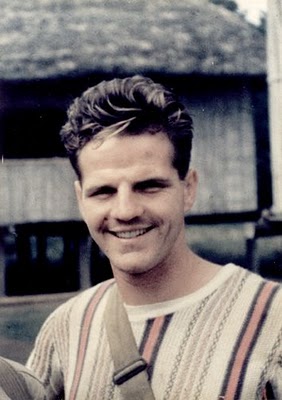
See you in class tomorrow, Lord willing.
8:23 AM My junk email has been crowded lately with attacks on all things homosexual. Most of these assaults come from "Christian" coalitions of kind or another and are, to put it kindly, mean-spirited and highly offensive.

I am seeing such counter-productive speech more and more in church, family, and the blogosphere. The attacks are clearly out of step with both the spirit and teachings of Jesus, who loved sinners (read John 4). The result is that the so-called conservative case for a less prurient society, a notion that has merit to the religious right, has become a caricature. Its cries of "Woe to you, sinners!" is more posture than plausible solution. The question of what makes marriage is settled in God's Word; it does not require governmental religification. (Remember that divorce rates are actually highest in born-again states.)
8:12 AM It was very kind of Jonathan Grubbs to want to repost my thoughts on the importance of sanctification in Anabaptist thought. In this connection, perhaps I could remind everyone what Balthasar Hübmaier said about the Reformers. He complained that they had learned only two of the three critically important doctrines of the Christian faith. The first doctrine was salvation by faith ("der gloub macht uns selig"). The second was that the Christian cannot do anything good by himself or herself ("wir mugen ausz uns selbs nichts guts thon"). He went on to say that the Protestants had completely overlooked the third lesson, namely that faith without works is dead. He wrote, "Under cover of these two half-truths all evil, unfaithfulness and unrighteousness have gained the upperhand, completely ... so that the old saying is fulfilled 'Ye alter ye böser.'" We cannot have a two-thirds faith, he said: "das volckh nit mer denn zway stuck geleernet hat."
Good advice, that. Don't be a two-thirds Christian!

Saturday, January 2
6:40 PM Twas a delightful day today. It was too cold to work outdoors so it was back to Nate's kitchen remodeling job. He dug, I unloaded dirt, he dug, I unloaded, and finally we spread plastic under the flooring. That was our single goal for today, so I feel great -- a "cycle of completion" completed, if you will.
Pix (of course):
11:45 AM Get ready for Brace for Impact -- the story of the "Miracle on the Hudson." It will air January 10 at 9:00 pm (EST) on TLC. Meanwhile here's a pic of the good captain and his wife in the Rose Parade:

11:34 AM Yet another good reason to emulate the Anabaptists was their genuine love for one another as expressed in loving deeds. So much did they share their goods with each other that the Magisterial Reformers accused them of practicing communism. The Anabaptists were not communists; that charge is a cliché, part of a legend that is repeated uncritically. But they did practice sacrificial love.
Balthazar Hübmaier (pictured below) wrote that "a man must at all times be concerned for his fellow man, in order that the hungry may be fed, the thirsty given to drink, the naked clothed. For we are verily not lords over own own possessions, only administrators and dispensers."

Julius Leuber likewise said that "as to community of goods, I am obliged to help the brother near me, out of brotherly love and without being coerced." Menno Simon noted, referring to the sharing of one's possessions with the needy, "If this is not Christian practice then we might as well abandon the whole Gospel of our Lord Jesus Christ, his holy sacraments and the Christian name."
This idea that ownership is really only stewardship led the Anabaptists to do what all Christians are commanded to do: "Share what you have with God's people who are in need" (Rom. 12:13).
Have you and I gotten out of the ownership business and into the stewardship business yet? May God help all of us to do just that in this new year.
8:59 AM Just ran across this exegesis of Heb. 1:1-4. It is a model of insightful, accurate biblical interpretation. The wonderful prologue of Hebrews deserves as much.
8:54 AM CNN will be covering the Pasadena Rose Parade in detail, beginning with this photo montage. The Grand Marshall this year? None other than Capt. Sullenberger. I'm sure he'll also be featured at this month's State of the Union Address (and rightly so).
P.S. If you've never camped out on Colorado Blvd. waiting for the parade to begin, you've never lived.
8:38 AM We are basking in beautiful sunshine today, temps around 25 degrees. The ground is finally hard enough for us to dig post holes. We've got gobs of cross-fencing to do. Glad Nate and Jess are back safe and sound. They enjoyed a few days with her parents in Maryland. I haven't seen Nolan in about a week and am undergoing severe withdrawal symptoms.
And Becky? She is doing good but is very tired. This week we'll have daily radiation treatments and I will resume teaching, so it will be a busy time for us. As always, we are taking one day at a time, trusting God to provide for our every need according to His glorious riches in Christ Jesus.
8:25 AM Hawaii would not be Hawaii without plate lunches and shaved ice. Just ask the president.

Once a local boy, always a local boy.
8:19 AM Quote of the day #2:
The real strength of al-Qa'ida is not that it can "train" a fanatical Nigerian student to sew explosives into his underpants, but that it can provoke an exaggerated US response to every botched attack. Al-Qa'ida leaders openly admitted at the time of 9/11 that the aim of such operations is to provoke the US into direct military intervention in Muslim countries.
Read Patrick Cockburn's outstanding piece Threats to Yemen prove America hasn't learned the lesson of history.
8:06 AM No doubt our government is doing its best to protect us from terrorists. But it will never be enough. This is the point of Stephen Flynn's latest editorial called 5 myths about keeping America safe from terrorism. As he notes, a vigilant public is the most effective response when danger threatens. Citing the Christmas Day attack near Detroit, he concludes:
We have only to look to the attempted Christmas Day attack to validate this truth. Once again it was the government that fell short, not ordinary people. A concerned Nigerian father, not the CIA or the National Security Agency, came forward with crucial information. And the courageous actions of the Dutch film director Jasper Schuringa and other passengers and crew members aboard Flight 253 thwarted the attack.
7:54 AM Thank you, Tim, for including verse 10. Verses 8-9 are not complete without it.

For more on this story, go here.
7:44 AM Quote of the day (Why do we fear persecution?):
I think perhaps one of the big reasons we fear persecution in the Western church is that we have no real community to support us. Our basis for community is getting together a couple of hours a week and our names on a membership roll. We depend on our family or on our savings account or our rights as Americans. If we were in a pinch we could probably find someone in the local church to help us out, but that is often the last resort. We desperately need to recover Christian community for the days to come. Anyone can see that the easy, comfortable days of Christianity are rapidly coming to an end.
I will have a lot more to say about suffering and persecution in my book Godworld, Arthur.
7:33 AM I happen to share brother Eric's interest in and appreciation for Reformed theology. I'm not convinced, however, that we practice what we preach. When I hear the 5 "solas" these days, Eric, I'm often tempted to interpret them as follows:
1) Sola Scriptura -- plus the writings of our favorite Reformed theologians.
2) Sola Gratia -- mixed in with our programs, methods, strategies, etc.
3) Sola Fide -- even though faith without works is dead.
4) Solus Christus -- in addition to our senior pastors.
5) Soli Deo Gloria -- plus honor to our manmade kingdoms and denominations.
I may be wrong. I hope I am. I fear I'm not. Calvin once said that "we must think so highly of the Word and the Sacraments that wherever we see them we are to conclude without a doubt that the Church is there, regardless of how much vice and evil there may be in the corporate life of men." Luther wrote, "Doctrine and life are to be distinguished, the one from the other. With us conduct is as bad as it is with the papists. We don't oppose them on account of conduct." The Anabaptists, of course, challenged such laxness in the matter of conduct. They insisted upon "conduct becoming saints," as does the New Testament, the point being that doctrine without life is as bad as life without doctrine.
The 5 solas are fine as far as they go. But let's never forget that Jesus said "By their fruits ye shall know them," not only by their platitudes and mottos.
Friday, January 1
8:05 PM In The Jesus Paradigm, I wrote: "In our current techno-urban society, there is so much pressure to conform to 'churchianity,' a form of Christianity that considers 'relevance' more important than service and sacrifice. For me personally, this involved an overcommitment to the academy and an undercommitment to Christian community and discipleship. Gradually I began to see the need to take seriously Jesus' announcement that he had come to preach the Gospel to the poor. He had status, but he didn't exploit it. He had power, but he used it to serve the needs of the outcast and stigmatized. He was willing to serve others even at the risk of his own life."
Whatever the new year holds for Becky and me, our one desire and prayer is that the Lord Jesus will be glorified in our lives as we seek to follow Him in obedience and love.

7:48 PM Alright! The new book Megabelt (it's about the so-called Bible Belt) has just received a very favorable nod by Anne Dalton.
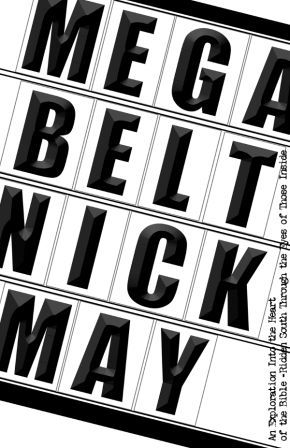
(One request, though: Let's not call it the "Bible" Belt any longer, okay? Religion Belt would work much better IMHO.)
7:34 PM Steve Rives will be offering beginning Hebrew in his -- get this! -- local church! Three cheers for Steve! Are you ready? Hip hip. Hip hip. Hip hip. May your tribe increase, brother.

P.S. Steve, don't forget to tell your students that when they have learned Hebrew they can also read their Hebrew New Testaments as well. I love reading the Gospels in Hebrew!
7:24 PM Stephen Hebert offers up this New Year's prayer.
Lord, show me the meaning of hope. Pour out your spirit, the greatest of gifts, on me and help me to experience hope, not in the plain, overused sense that we Americans use the term, but in its full and rich meaning.
God, if this means that I must come to understand suffering, then let it be. I know that I am suffering even now in separation from you, but I have found ways to medicate myself, ways to stop the pain. I have allowed the numbing effects of this world (e.g., media addiction) to stand between me and suffering and hope and joy and you.
Jesus, strip me of my pretensions, found in me your Kingdom, and help me to understand what it means to turn, serve, and wait.
Wow. All I can say is, Amen!
(Not true. I must add one more thing: Any website that has a Latin subtitle has got my blessing.)
7:06 PM This email arrived today from Australia. I hope you enjoy it as much as I did!
Your comment regarding Gaius Sallustius Crispus's words reminded me of
something that happened about 35 years ago when I was a young deacon.
A young man, just graduated, and looking to enter pastoral ministry, had
finished preaching a lo-o-o-o-ng message, which I think encompassed, and
included, everything he had learned, even Greek. A much respected old deacon (who ought to have been an elder) came out of the church rubbing, and
shaking his head.
Seeing the look on his face, I said, "What's up Charlie?"
Charlie, who could preach some of the best sermons I ever heard, said,
"John! I heard what he said, but I don't know what he was talking about!"
I believe that's called being educated beyond one's intelligence.
6:55 PM Our first supper of the new year? Liver smothered with onions. Heavenly.
2:45 PM I predict that Iran will become the biggest story of 2010. Anti-government clashes will increase, and the U.S./Israel alliance will push harder and harder for sanctions. Iranian opposition leader Mir Hossein Mousavi will step in to calm the unrest. Whether or not he is effective and prevent an attack by the West -- that will become THE news story of the year.

2:34 PM Been reading the letters of the young Adlai Stevenson. Remarkable stuff, really. In 1920 he is touring Europe, including Germany, and can find nothing kind to say about the German language, which he finds abhorrent ("that extremely ugly language"). He notes in a letter to his mother dated Aug. 1, 1920, that "the language, in my opinion, is a very disagreeable one to hear." He talks about Germans always seeming to yell whenever they speak.

Three comments:
1) Stevenson is correct to emphasize the sounds of German, for language is essentially speech, not writing. All the more reason to learn how to speak the language correctly if you are a doctoral student. The ear gate then comes into play (as it ought), not only the eye gate.
2) German is neither easy-going in pitch nor easy in style, but I find nothing disagreeable or ugly about it at all. Quite the contrary. The language is artful in both concepts and expressions. There is, to be sure, a certain theatricality about speaking it in public; Germans tend to talk and act as if they are quite aware of an impressionable audience. I too find myself raising my voice a bit whenever I speak German, which seems like a very natural and ordinary thing to do (at least to me).
3) I believe that German has a certain flexibility of expression that English sometimes lacks. The work of Karl Barth will illustrate this. He is at his most skilful in contriving transitions from one point to another and takes advantage of the German ability to embed ideas. (For a sample, go here.) I shall never forget attending the lectures of his son, the famous Neutestamentler Markus Barth, in the early 80s in Basel. As the professor entered the lecture hall he was greeted by the enthusiastic rapping of knuckles on our desks (the German custom), then things grew silent as we waited for the lecture to begin. Professor Barth was quite blind by this time, and although he carried an armful of notes with him into the hall he never used them. His lectures were superlative, and all from memory, replete with lengthy spoken footnotes and rabbit trails. I often thought that Markus spoke just like his father wrote: lots of embedding. We also see embedding, by the way, in the highly stylized prose of certain portions of the Greek New Testament (I have written about this in several essays, including one on the literary artistry of Hebrews). However, much of the Greek New Testament is rather sinewy, forthright, and charming, stripped of much of the finery of the Attic dialect from which it evolved.
It seems that one is guilty of a bit of linguistic chauvinism to insist that one language is more sonorous than another, but I do admit to having to change my diction a bit when I speak German -- a language I have truly to come to love and appreciate throughout the years.
11:15 AM Several of you J-term Greek students have asked me if there is anything you can do to prepare for Monday's class. Well, not really -- unless you'd like to get a jump start on the infamous Greek Alphabet Song I've written (Appendix 2). Since the tune might be a bit unfamiliar to some of you, here's a link that might help. The tune, by the way, is from an old song called "Mama's Little Baby Loves Shortnin' Bread." Remember: On Tuesday's quiz you will be expected to sing this song aloud with perfect pitch.*

* Jest kiddin'.
11:05 AM The only other thing about the Anabaptists I'll post today (same source):
To the Anabaptists, then, a clerical ministry seemed out of step with both the spirit and the letter of the New Testament. As Heb. 13:7 shows, the authority of leaders was based not on their position or title but rather on their example (anastrophe) and faithfulness (pistis). The relationship of members to leaders was not one of duty but of love and respect. We have to recognize that theologians themselves have done much to create this confusion. Jesus' model of church leadership has nothing to do with status or office. This monumental misunderstanding of the New Testament seems to me to be one of the flagrant proofs that the Anabaptists' return to the doctrine of the priesthood of all believers was both necessary and inevitable for a group so earnestly seeking the truth of the Word of God. I see this same spirit at work today when I see younger leaders eschewing grand titles such as "reverend" or "minister" or "senior pastor," preferring instead to be called “brother” or simply by their first names. This kind of thinking is contrary to every manmade system or philosophy. A Christianity that seeks no power, no prestige, no position but instead prefers humiliation, service, even suffering? Unthinkable – except, perhaps, to someone travelling the downward path of Jesus.
8:12 AM The only thing about the Anabaptists I'll publish today:
... it seems to me that the Anabaptists of the sixteenth century were willing to do what few of their religious counterparts today are willing to do: abandon "security" and live as true pilgrims and strangers on earth. The Anabaptists did just that, and they did it in the face of terrible persecution from their contemporaries, Catholics and Protestants alike, who contemptuously labeled them "Re-Baptizers." In sixteenth century Europe a person could not be called a dirtier name. The Anabaptists were considered the arch-enemies of Europe’s entrenched religious and political institutions. They were regarded as more than ill-informed and antisocial. In a world of religious wars and economic rape, they were deemed to be demonically-inspired heretics. When the nation-states demanded them to bless their ambitions and sanctify their warring, the Anabaptists simply refused. But they weren't anarchists. Their view of a just and limited state was self-consciously Bible-based, and by withdrawing from the "culture" of their day they struck a radical blow for liberty and conscience, a blow still felt to this day.
Source: The Jesus Paradigm.
7:55 AM Quote of the year (Maureen Dowd):
If we can't catch a Nigerian with a powerful explosive powder in his oddly feminine-looking underpants and a syringe full of acid, a man whose own father had alerted the U.S. Embassy in Nigeria, a traveler whose ticket was paid for in cash and who didn't check bags, whose visa renewal had been denied by the British, who had studied Arabic in Al Qaeda sanctuary Yemen, whose name was on a counterterrorism watch list, who can we catch?
Dowd is hardly a Bush conservative, but she makes a good point. Hers is an excellently clear analysis, which I greatly recommend you to read if you have the chance.

7:48 AM Yesterday I was reading Gaius Sallustius Crispus's War with Jugurtha (De Bello Iurgurthino) when I ran across this delightfully witty quote:
...neque litteras Graecas didici: parum placebat eas discere, quippe quae ad virtutem doctoribus nihil profuerant.
A rough translation would be, "Neither did I learn Greek; in fact, I never wanted to learn it, for it did nothing for the character of the teachers."
Amen and amen! There is very little about knowledge per se that shapes one's character or "virtue," as Crispus puts it. For character one must dig deeper than the brain.